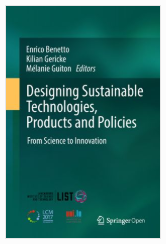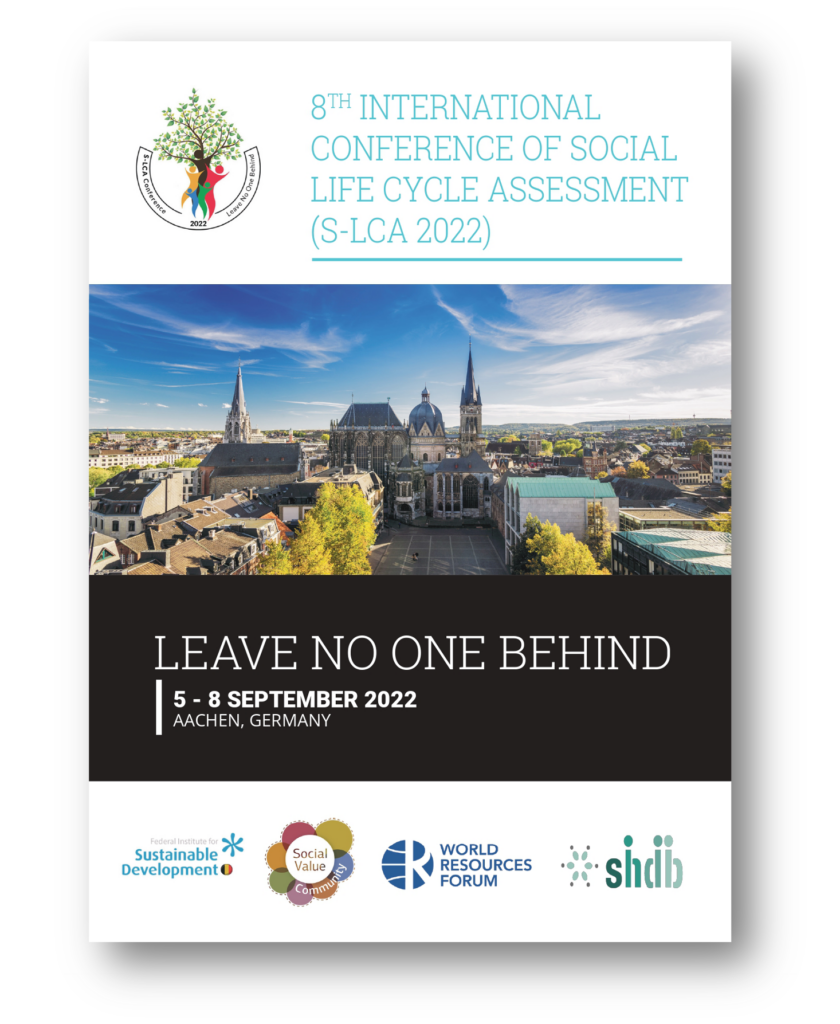
We are pleased to announce the release of the Proceedings Book of the 8th International Conference on Social Sustainability Assessment (S-LCA) 2022, held in Aachen from 5-8 September. This special event brought together more than 150 people from all over the world.
Throughout the conference, S-LCA experts were invited to explore and discuss the critical role of social life research in promoting integration and sustainable development. A variety of presentations, discussions and workshops reflected innovative ideas and research findings dedicated to ensuring that no one is left behind in our quest for a world of social responsibility and equity.
Contained in The Book of Proceedings are abstracts that capture the highlights of the conference. These abstracts reflect the global S-LCA community’s commitment to promoting social responsibility and inclusion.
The book is available here.
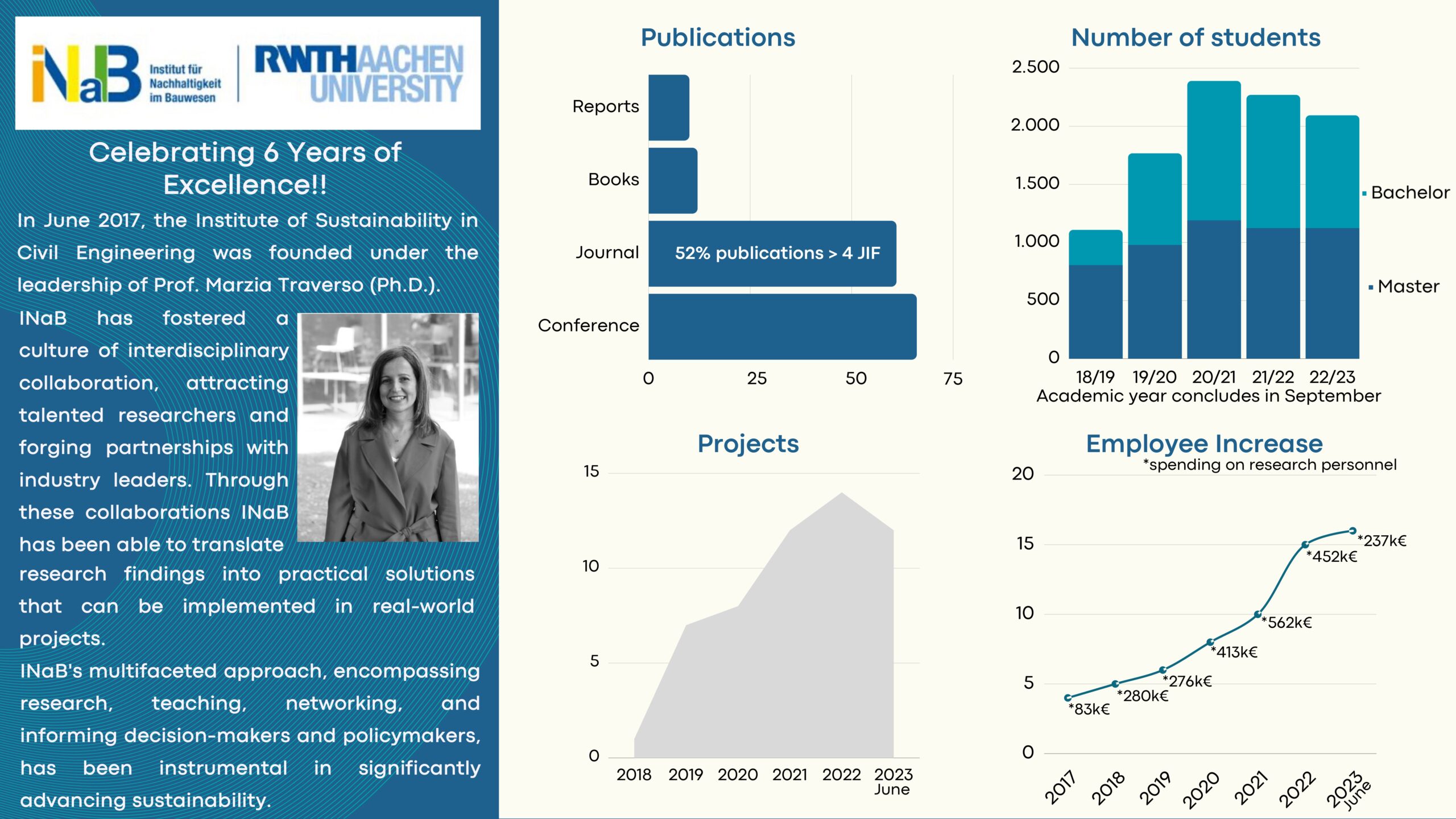
As we celebrate our sixth anniversary, we at INaB are proud of our significant strides in promoting science-based sustainable practices and principles. Since our establishment in 2017, we have remained steadfast in our commitment to promote sustainability in education and research across all sectors.
Alongside knowledge transfer to future professionals, promoting sustainable practices and technologies anchored on standardized sustainability assessment methods and tools, INaB was at the forefront of the following milestones in mainstreaming and operationalizing sustainable development:
– Guidelines for Social Life Cycle Assessment of Products and Organisations 2020,
– Methodological Sheets for Subcategories in Social Life Cycle Assessment (S-LCA) 2021
– Pilot Projects on Guidelines for Social Life Cycle Assessment of Products and Organizations 2022
Looking ahead, we are committed to expanding our reach, forging new partnerships, and driving innovation to pursue a more sustainable future. Together with our stakeholders, we will continue to lead the way in promoting sustainability assessments in all three dimensions; environmental, social and economic.
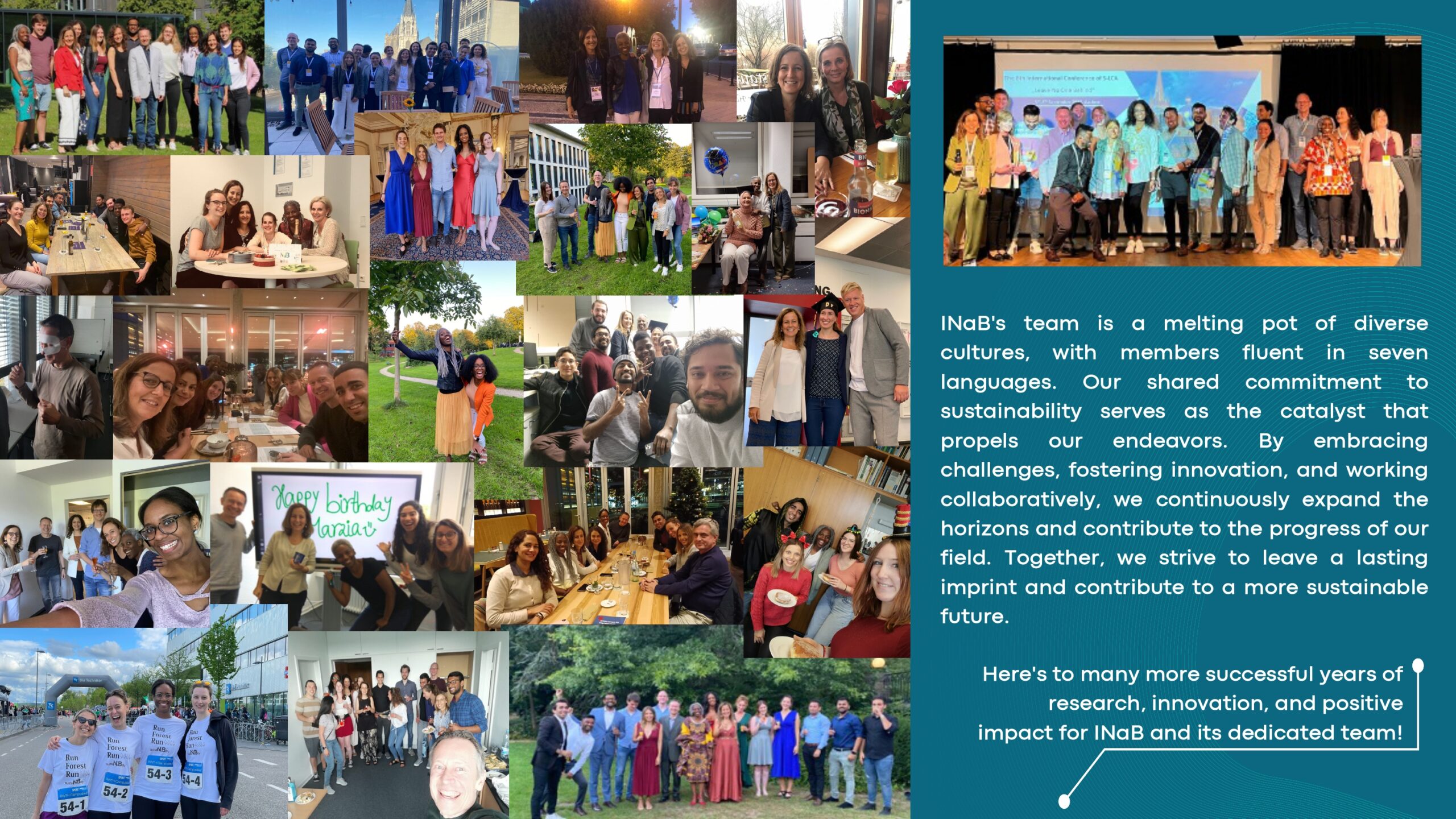
Through one of our projects – SFB/TRR 339: Digital Twin Road – an International Summer School is being organized by the institutes ISD (TU Dresden), gia (RWTH) and the German Federal Highway Research Institute (BASt). This is a great opportunity to come into contact with other master and PhD students and learn and/or expand your knowledge about roads, cyber physical systems and digital twins, as well as life cycle sustainability assessment in the context of roads. Many interesting lectures and workshops are part of the program.
The Summer School will take place from 21.08.2023 to 25.08.2023 at the BASt in Bergish Gladbach (near Cologne).
Click on the photo on the left for more details.
Attention professionals! Beware project – Erasmus+VET online free course for professionals!
Are you looking to upskill and take your career to the next level? Look no further than our new professional course, ” New trends in Building Resilience and Sustainability to Extreme Weather Events”. In this course, you can enroll in several modules of your choice such as:
Eco-design and social needs, Insulation materials, Nature-based and waste-based solutions, Energy efficiency and economic assessment, Digitalization- Building Information Modelling (BIM), and Risk assessment which are essential for professionals, engineers, civil and material engineers, architects, designers and also students and building market and association actors representatives.
More info here
INaB’s head-Prof. Marzia Traverso has been appointed as the Rector’s delegate for African countries. As the Delegate, she will be responsible for promoting and establishing collaborative programs between RWTH Aachen University and institutions in various African countries. Some of the previous and ongoing activities at RWTH include:
– Partnerships and collaborations with African universities in the IDEA League Africa WG. IDEA League is a strategic alliance between five leading European universities of science and technology. Joint research projects, summer schools, student exchanges, and entrepreneurship support is provided under this program.
– Developing and submitting funding applications for partnerships with universities in Africa and using the AROP scholarship program to establish and expand academic relations. AROP stands for African Research Opportunities Program, and it provides opportunities for African students to pursue master’s and doctoral degree programs in research-oriented fields at selected universities in Africa.
– Engaging in fact-finding missions to explore potential areas of collaboration with universities in Namibia, and negotiating MoUs and SEAs with both Namibian and other African partners with a focus on Green Hydrogen.
– Participating in Capacity Building Working Group to present relevant topics in collaboration with African universities under Global South Lecture Series, a virtual platform to give topics in collaboration with countries in the Global South, more visibility and a forum at RWTH.
– Supporting RWTH activities under the framework of WASCAL together in collaboration with FZ Jülich and University of Rostock. WASCAL (West African Science Service Center on Climate Change and Adapted Land Use) is a research-focused organization that aims to enhance the resilience of West African countries to climate change and variability. The project is implemented through a partnership of institutions from 10 West African countries, Germany, and France.
We wish the new Rector’s Delegate for Africa success in her new role!!!
The TranSensus LCA project has begun in Brussels, with the aim of harmonizing a commonly accepted and applied LCA approach for zero-emission vehicles. The project is supported by the European Commission and involves 44 stakeholders from the vehicle and battery industries, energy providers, and recyclers. The goal is to develop a standardized and transparent LCA approach to support the transition towards a climate-neutral transport system. The consortium is composed of 11 industrial partners and 9 research partners, along with 24 associated partners. The project will conceptualize a real-data, European-wide LCA approach and create a framework for LCI data management. It is seen as a key element in achieving the European Green Deal targets. The project will embrace environmental, economic, and social aspects to provide sustainable products and optimize mobility solutions. The TranSensus LCA project is expected to make Europe the first digitally enabled circular, climate-neutral, and sustainable economy. The project kick-off was attended by 60 representatives from the project partners.
More info here
Attention all researchers and professionals in the field of Social Life Cycle Management!
The 11th International Conference On Life Cycle Management is to be held on September 6-7-8, 2023 in Lille, France.
INaB, RWTH Aachen University will be chairing two sessions on S-LCA:
More details here
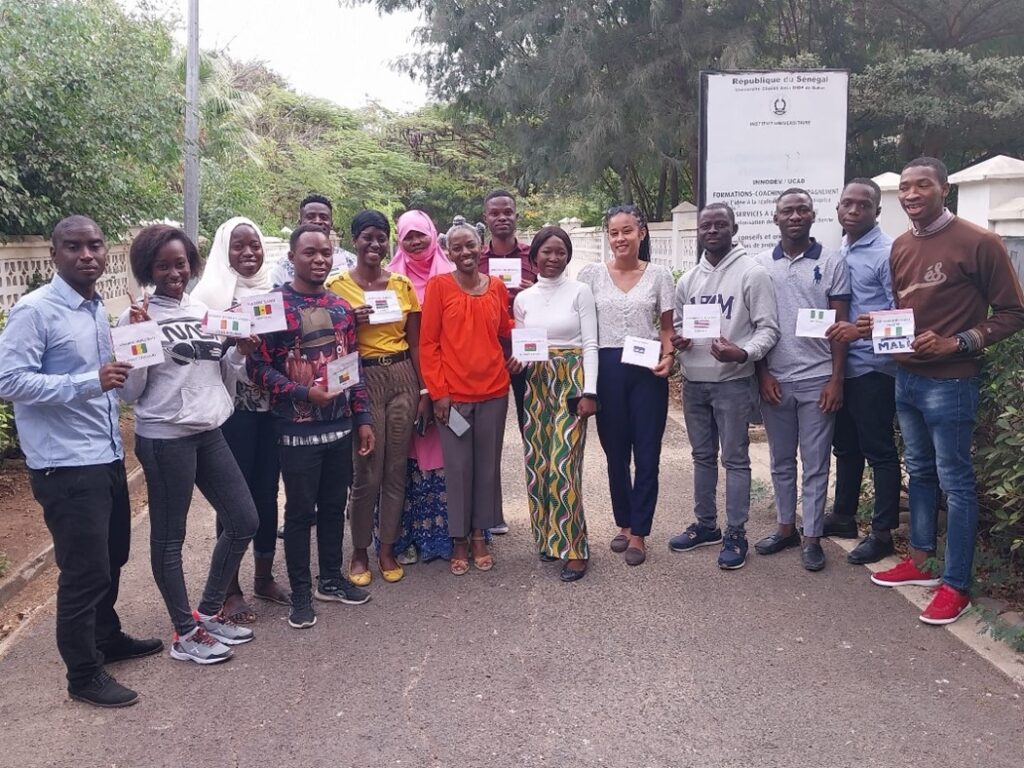
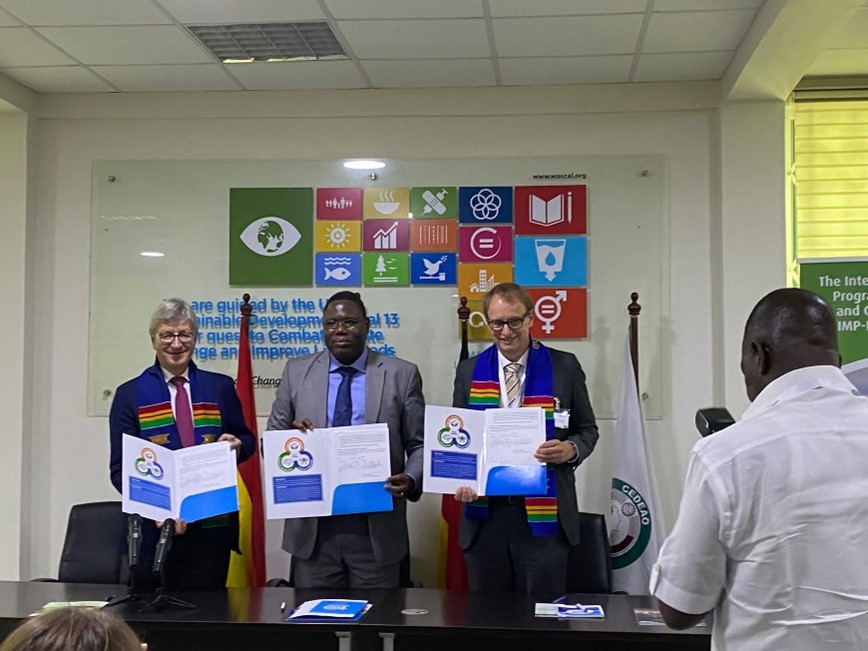
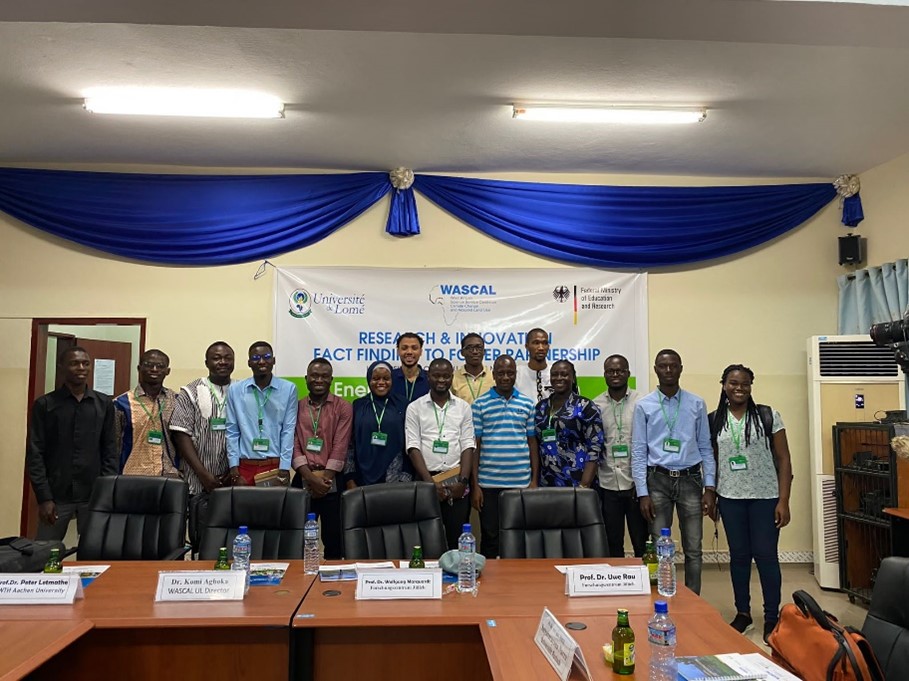
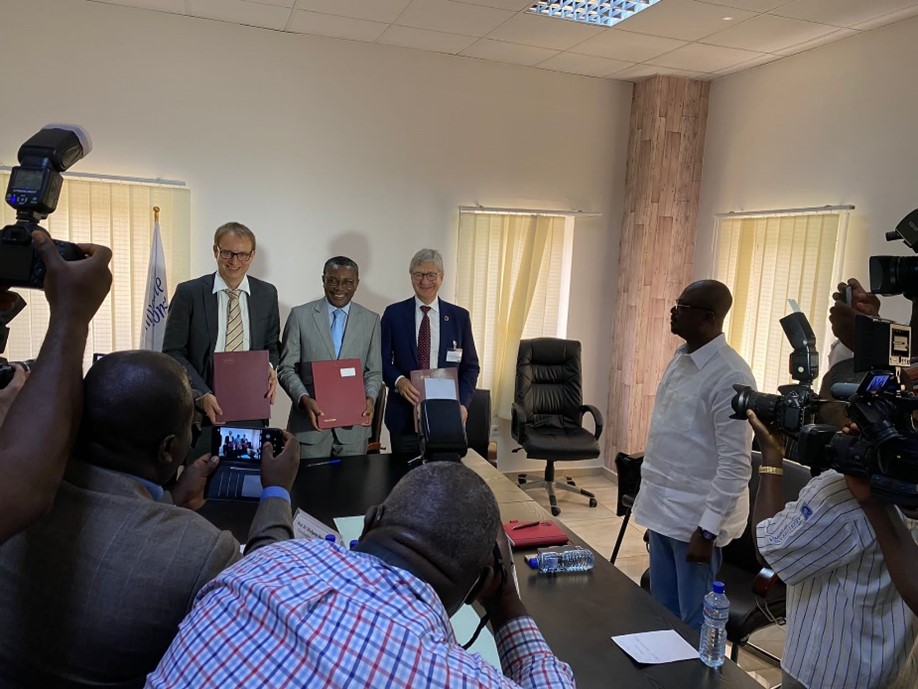
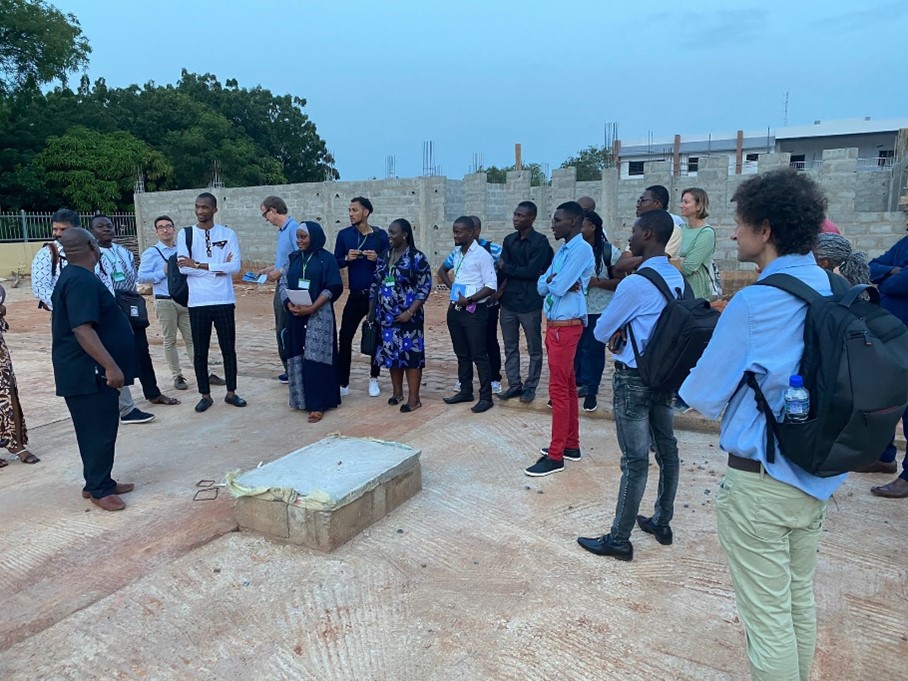
As part of the Master’s programme “International Masters Programme in Energy and Green Hydrogen” (IMP-EGH), INaB recently provided a one-week course in Dakar. The course entitled Sustainability Assessment Methods and Tools for energy and emerging technologies was delivered to students coming from 14 west African countries at the Université Cheikh Anta Diop de Dakar . Knowledge and insights on sustainability strategies and in particular Life Cycle Assessment (LCA) methodology characterized the intensive lectures including practical sessions. The main objective was to enable those students to identify and assess sustainability performance in ensuring a sustainable transition to hydrogen energy in the West African context.
Through the Master’s programme, called (IMP-EGH), the west African students are provided interdisciplinary tools for developing future “Green Hydrogen” in their various realities. The lectures are held by professors from Germany. Students can specialize in six different areas, for example economics, photovoltaics or green hydrogen technology. At the end of the study programme, the students will write their Master’s thesis in Germany.
In November, INaB already took part in a delegation trip to West Africa, together with the University of Rostock and the Research Centre Jülich. On Friday, 4 November 2022, an agreement was signed in Accra (Ghana) for a stronger cooperation between West African universities and WASCAL (West African Science Service Centre on Climate Change and Adapted Land Use). West Africa has enormous potential to generate solar and wind energy to produce green hydrogen additional to its own needs, and thus can even export sustainable hydrogen to other countries .
More information can be found here.
07 and 08 February 2023
In cooperation with the Federal Highway Research Institute, the Baden-Württemberg Construction Industry and the Association of Road and Traffic Engineers Baden-Württemberg, the Technical Academy Esslingen (TAE) is already organising the 3rd Colloquium on Road Construction in Practice on 7 and 8 February 2023. The symposium presents innovative processes, methods and technologies for holistic road construction. The thematic focus is on contributions to sustainability and CO2 savings in road construction. It shows perspectives and concrete applications for practice as well as diverse combinations with the possibilities of digitization.
The symposium with accompanying exhibition is aimed at specialists and managers in engineering offices, construction companies, building material manufacturers, municipalities and road authorities, research institutions and software developers. It is recognized in accordance with the advanced training regulations of the Baden-Württemberg Chamber of Engineers and the NRW Chamber of Engineers.
You are no environmental evaluation expert but you’d like to understand what Product Environmental Footprint (PEF) is, what answers does it offer to the growing demand for green products, how it works and what role it can play in the consumer choices to favor sustainability, environment and the circular economy?
Together with our partners and the leader ENEA, we have produced a short explanatory cartoon video for the layman as part of our Life MAGIS project. Check it out!!
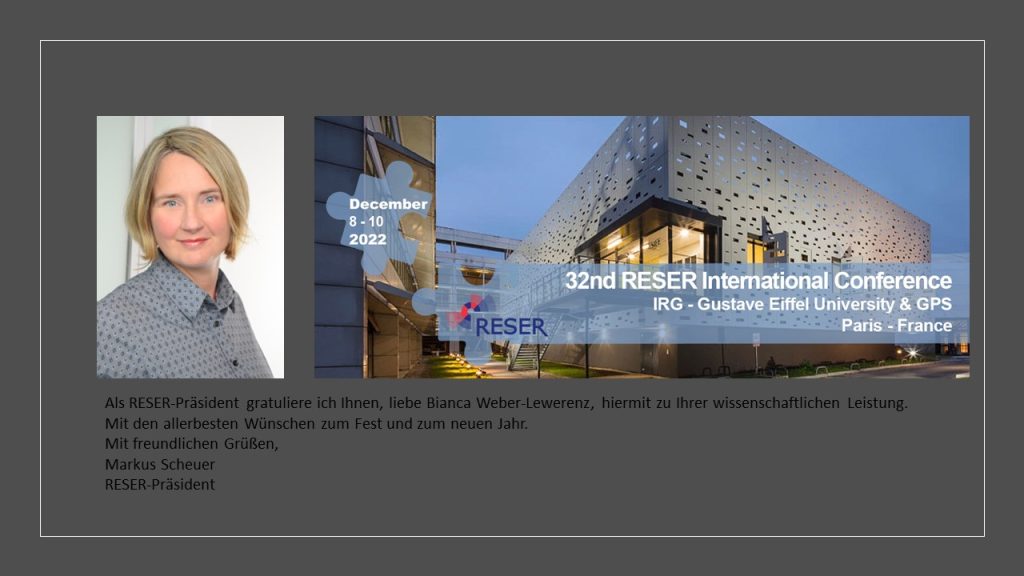
With her conference paper “The drivers and dynamism of Smart Cities – Best Practices implementing innovative technologies for sustainable building life-cycles”, Bianca Weber is awarded the RESER Founder`s PhD Award. The paper, which was written with the support of Marzia Traverso, is one of the two best presentations of PhD students presented at the RESER International Conference 2022!
In the 2nd week of November 2022, our institute hosted a 5-day workshop in lieu of BeWare project, funded by European Erasmus+ program. The project focuses on qualifying engineers and other professionals in the construction industry to make building envelopes more resilient to climate change through innovative and sustainable solutions.
The participant members include ULISBOA- Portugal, RWTH- Germany, Institute for Research in Environment, Civil Engineering and Energy (IECE) – The Republic of North Macedonia, Creative Thinking Development – CRE.THI.DEV – Greece, and UNIR – Spain.
The workshop witnessed presentation on carbon reinforced concrete applications and a tour of carbon fiber facilities at RWTH. Prof. Heribert Nacken presented the potential use of Virual Reality(VR) and avatars in Digital teaching. Biowaste based solutions were explored in the context of sustainable construction. ULISBOA presented the relevance of Climate change and extreme events and their relationship with built environment.
The workshop concluded with an analysis on Latest trends on Resilience-Sustainability-building nexus and their relevance with reference to objectives of BeWare Erasmus+ project.
Versatile backgrounds of participants and their enthusiasm towards sustainability topics ,resulted in healthy discussion and positive intellectual contribution towards resilience in buildings sector.
More here.
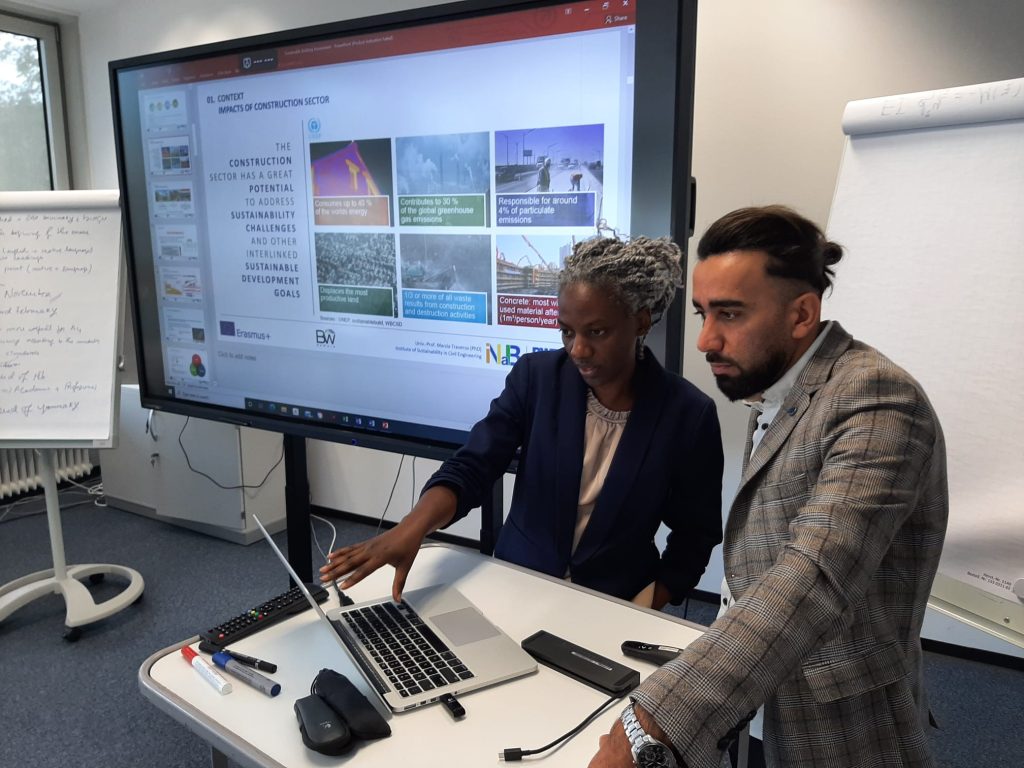
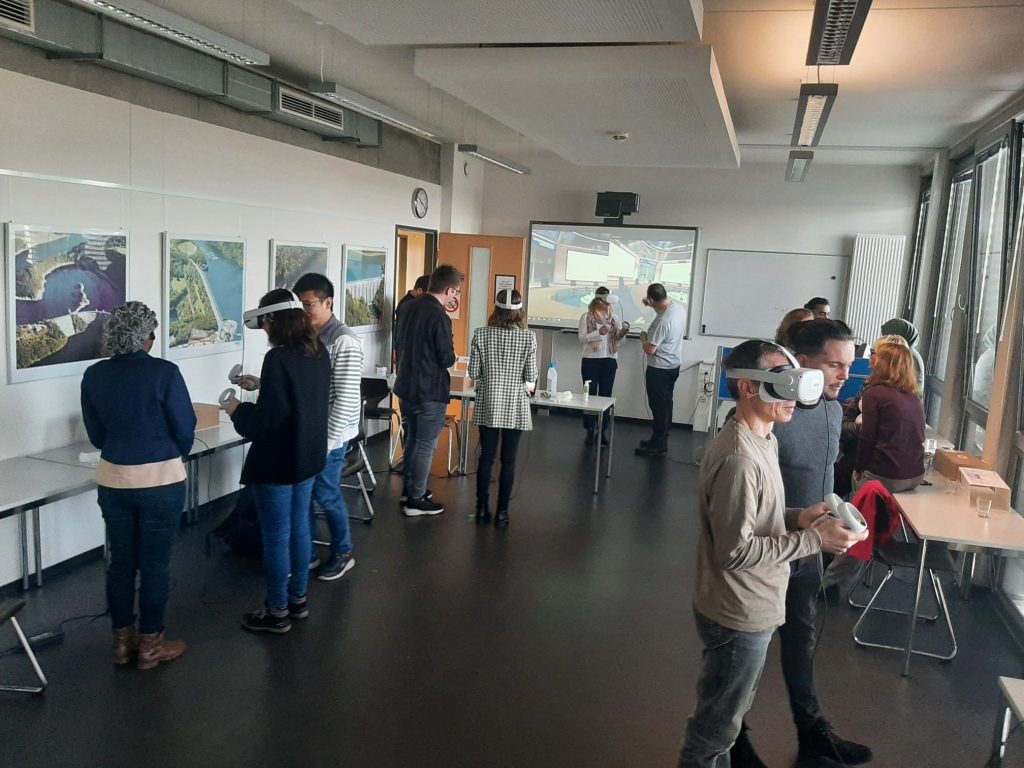
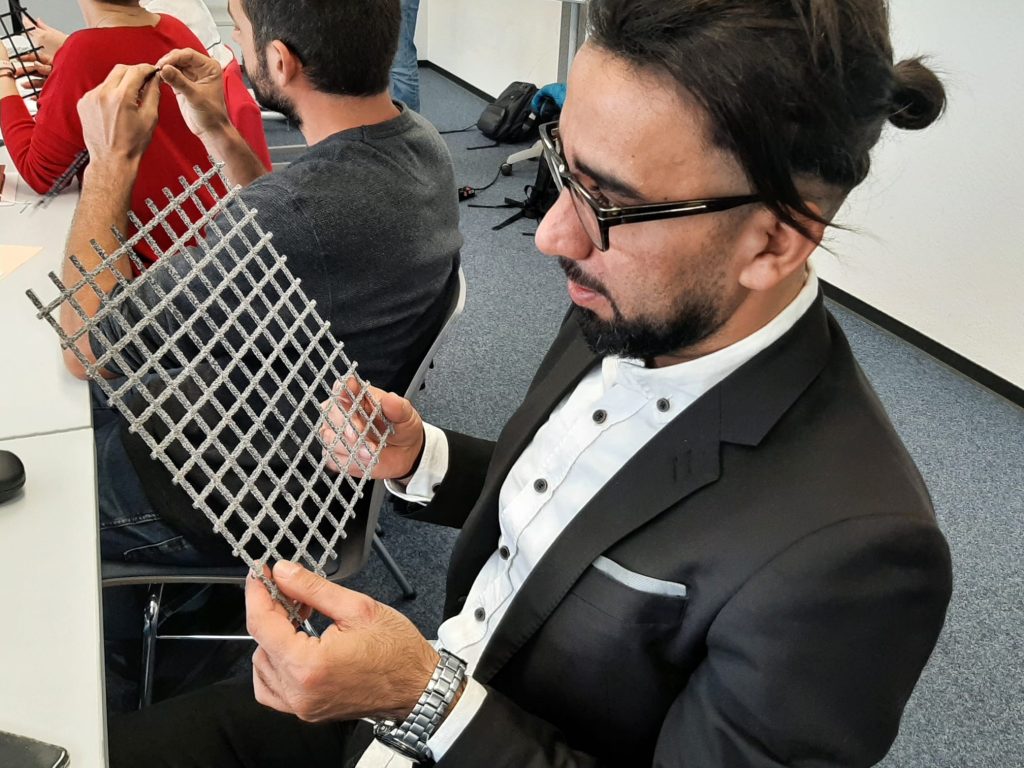
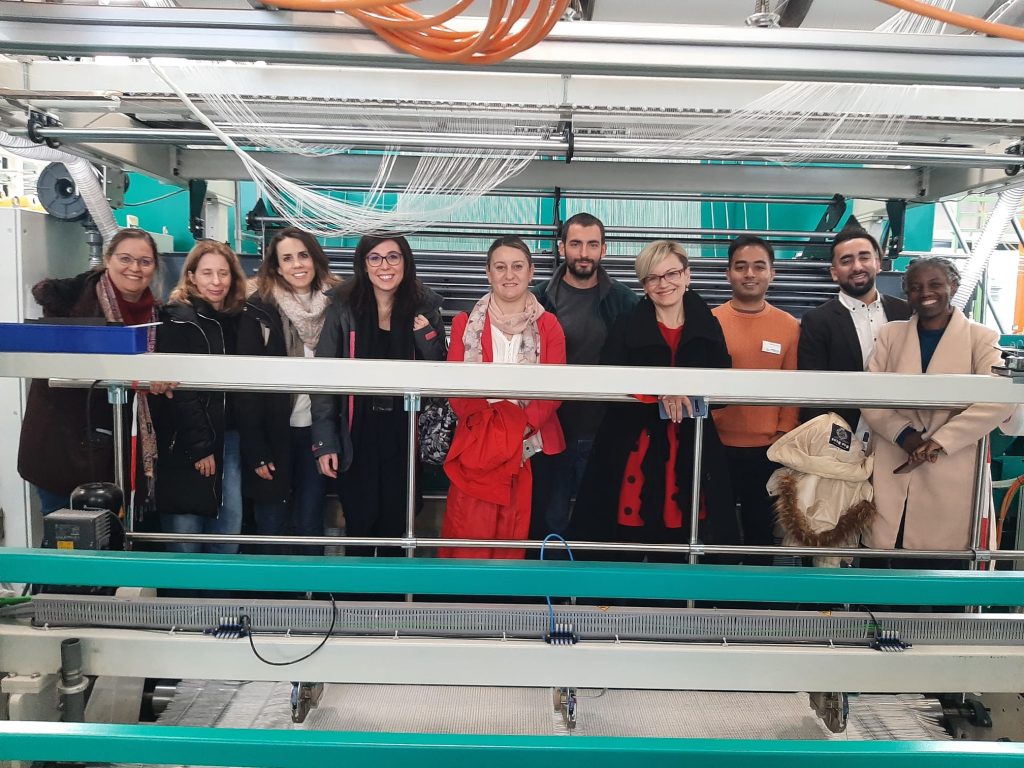
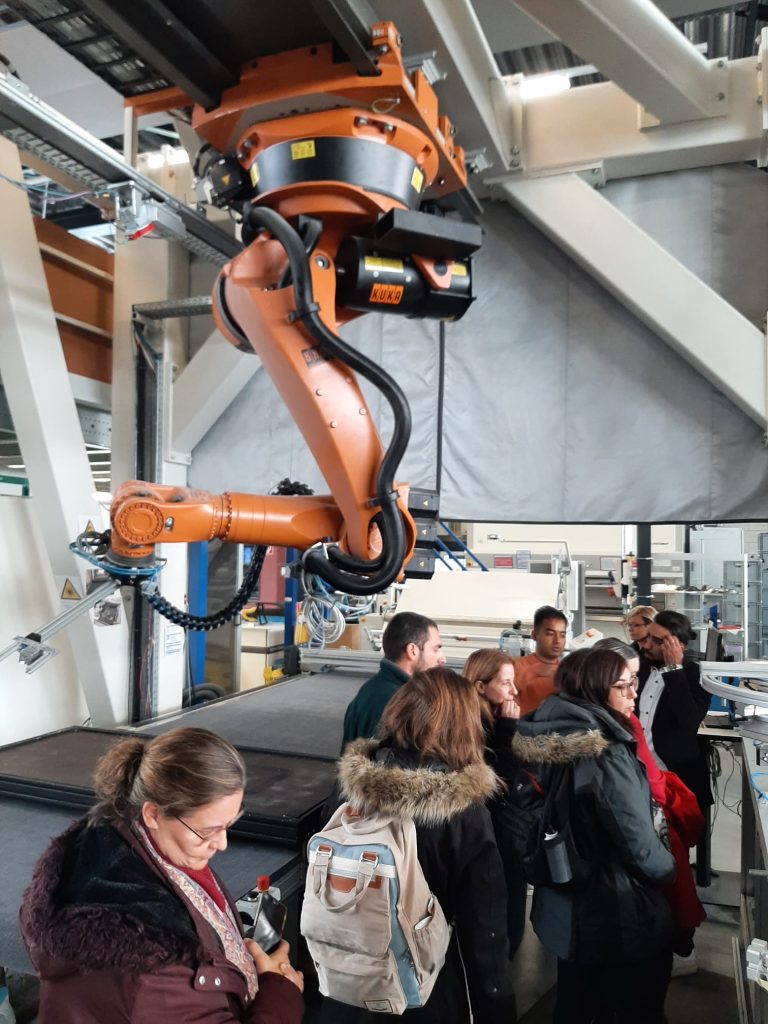
A month ago we successfully concluded this year’s S-LCA conference in Aachen. Once again we thank all participants for their commitment and dedication to this highly relevant topic.
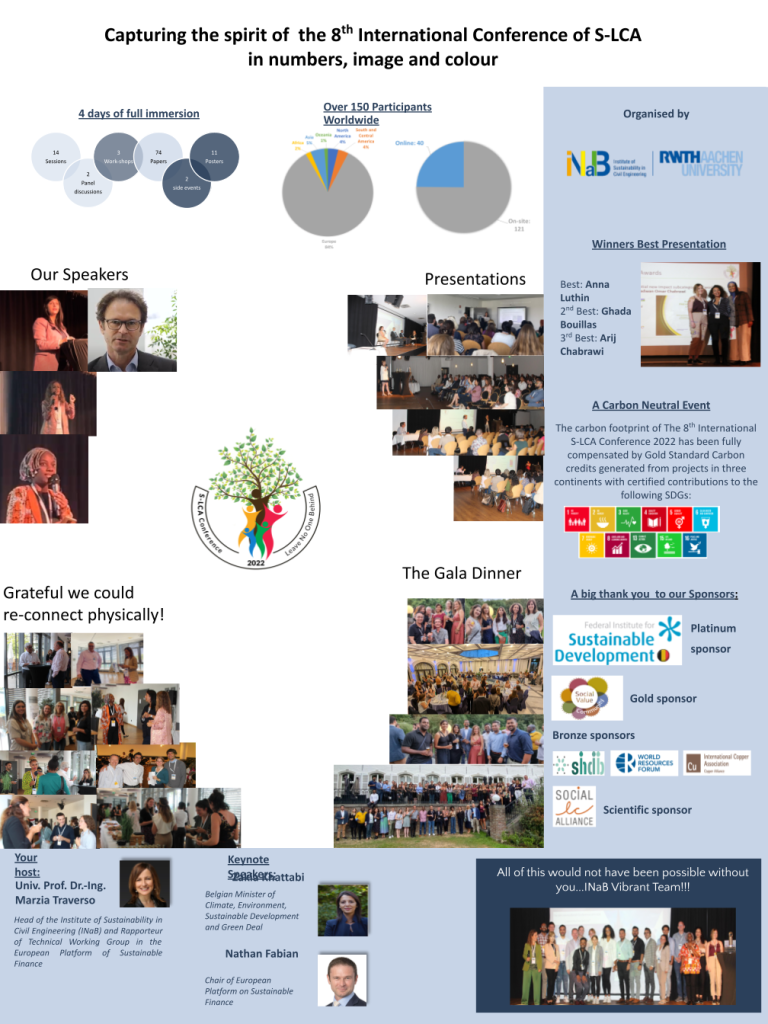
Jana Gerta Backes hat im Rahmen des fib International Congress 2022 Oslo mit ihrem Paper: „Sustainability of textile reinforcements for carbon concrete – today and tomorrow“ den Innovation Contests (best paper award) in der Kategorie „Durability“ gewonnen. Vielen Dank für die tolle Auszeichnung!

A technology exposition (TechExpo) was held in Kampala, Uganda from 30th to 31st March 2022 co-organised by the Institute of sustainability in Civil Engineering (INaB) of RWTH Aachen University. The TechExpo is one of the activities of the German Federal Ministry of Education and Research (BMBF) funded TeTraPHar Africa Project involving Uganda Cleaner Production Centre (UCPC) and Mzumbe University (MU). The main goal of TeTraPHar Africa is the increase of research uptake by industries, especially SMEs in Sub-Saharan Africa.
The TechExpo provided the opportunity for sustainable technologies to be showcased and brought together technology suppliers, SMEs of potential users, governmental institutions and investors. A particular attention was on innovative and unique technologies to enhance resource efficiency and Post-harvest loss management. Technology users, researchers, policy makers and the general public interacted with the exhibitors of, among others, Solar Dryer House (SDH) technologies, innovative irrigation systems, biogas generation and supply systems.
For more details on the TetraPHar Africa project and TechExpo Kampala, please visit: TeTraPHar Africa – TechExpo Kampala 2022
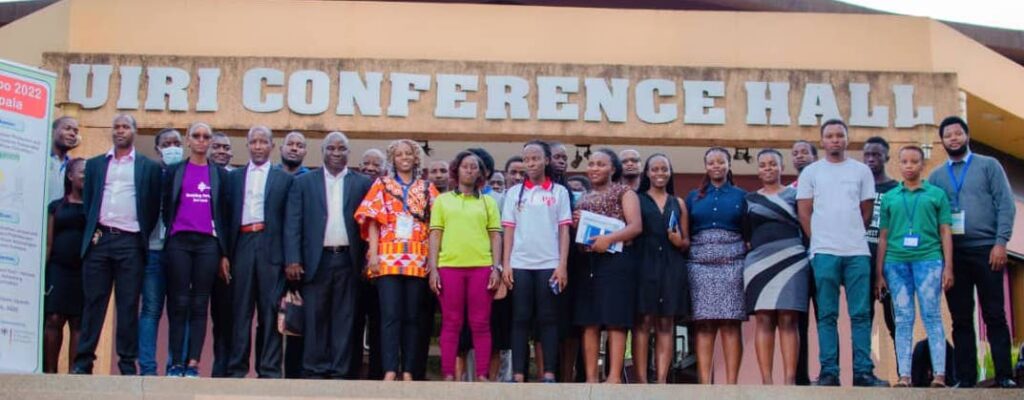
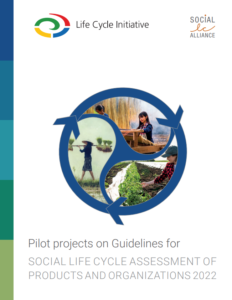 After the successful completion of the first phase of the project – the revision of the Guidelines and the methodological sheets for S-LCA – the end of the second phase follows with the publication of the pilot projects.
After the successful completion of the first phase of the project – the revision of the Guidelines and the methodological sheets for S-LCA – the end of the second phase follows with the publication of the pilot projects.
The project to revision the Guidelines for Social Life Cycle Assessment of Products and the related methodological sheets started in September 2017 under the guidance of the Social LC Alliance, with the participation of several experts and practitioners of S-LCA.
The project was divided into two phases. The first phase consisted of revising the guidelines and methodological sheets, and the second phase consisted of testing the practicality of the guidelines as well as the benefits and challenges of implementing them. The pilot projects are based on the third draft of the revised guidelines, which was finalized in December 2019. The call for pilots was launched in April 2019 and nine applications were submitted and respective pilots completed in 2021.
Seven out of the 9 pilots focused on the implementation of the Guidelines at product or service level. The other two pilots assessed the social impact at organizational level implementing SO-LCA, as required in the Guidelines (UNEP 2020). Most of the pilots focused on the collection of primary data in assessing the positive and negative social impacts, taking into consideration local conditions and defining reference points against which impacts on stakeholder categories are evaluated.
The Pilots confirmed the role of the Guidelines in providing a structured methodology on how to conduct a S-LCA for any type of product and organization. The reports state that the Guidelines offered a relatively straightforward path to measure social performance and risks. In particular, for policy and decision making, the pilot participants stated that S-LCA is effective in highlighting social risks or performance of complex systems and potential solutions for identified problems.
Related links: Pilot projects on UNEP SLCA-Guidelines 2022 Guidelines for S-LCA of Products and Organisations 2020 Methodological Sheets for Subcategories in S-LCA 2021
As of 1.6.2022 Prof. Marzia Traverso is confirmed Professor at RWTH Aachen University … for life!!!
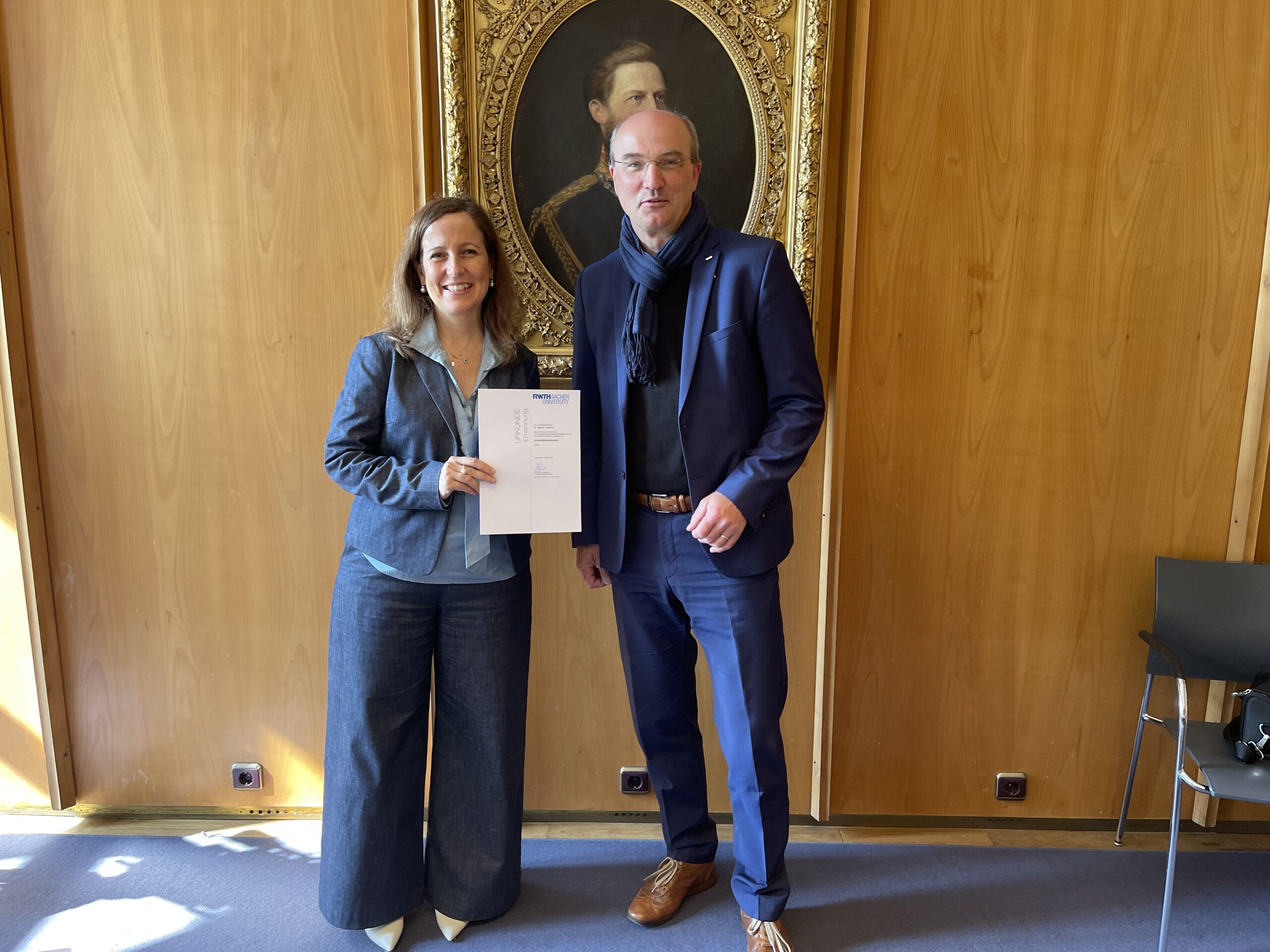
The ‘EU Platform for Sustainable Finance‘ has published two groundbreaking reports at the end of March to extend Sustainable Finance in the EU to further economic sectors.
For this purpose, an EU Taxonomy Briefing with the experts of the “EU Platform for Sustainable Finance” took place on Friday, April 8, 2022.
In this webinar, organized by Climate & Company, entitled: “More than Climate Change: A Taxonomy for Biodiversity, Circular Economy, Pollution & Water“, Ingmar Jürgens, Dr. Marzia Traverso, Dr. Astrid Matthey and Sonja Haider explain the key points from the second report. Watch the video here.
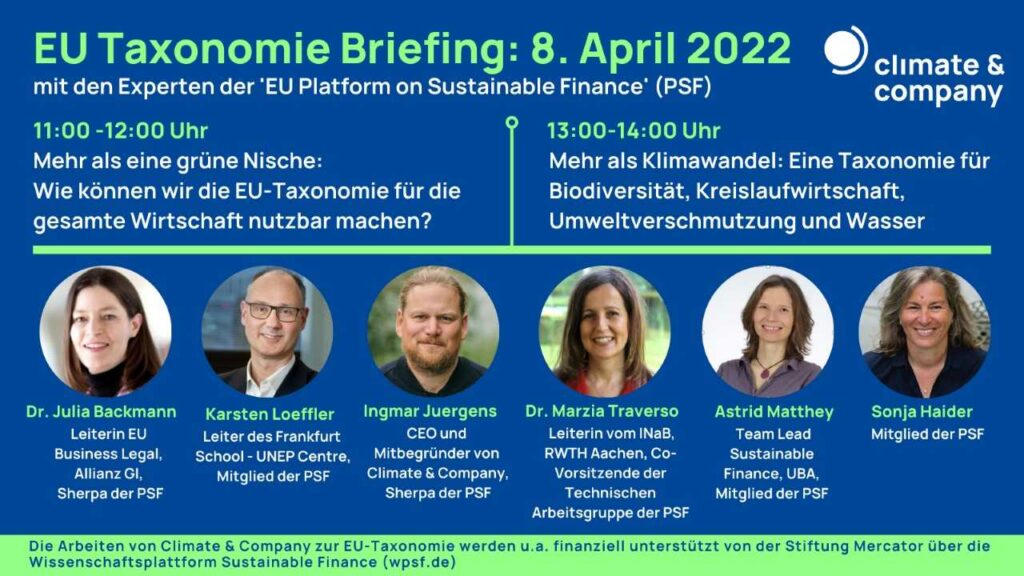
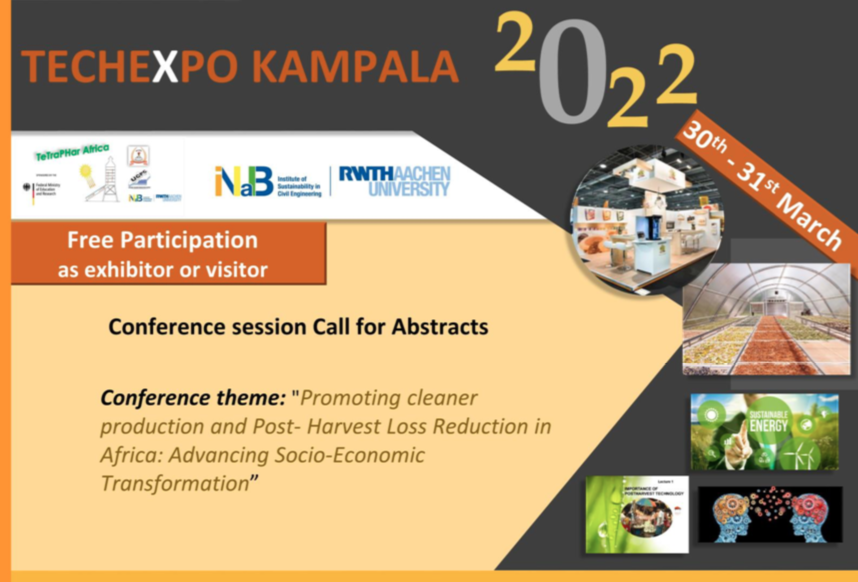
As part of the TeTraPHar project, an international technology exhibition will be held in Kampala from March 30 to 31. This TechExpo will offer consumers an opportunity to see the latest and most effective sustainable technologies and innovations in action. The technology exposition will be wholly inclusive and open to all interested stakeholders, as a ‘go-to’ hub to build partnerships and to showcase ground-breaking sustainable technologies in resource (energy and water) efficiency and post-harvest waste management. It will facilitate contact and interaction among policy makers (especially related to science and technology), Inventors, Innovators, academic/ research institutions and the private sector (especially MSMEs) on available sustainable technologies. Invitation to take part in the TechExpo is open to all entities, public or private, offering such technologies including private sector enterprises and academic and research institutions in Africa.
For more information, please click here.
On December 31st, without any prior notice, the European Commission, at 21:59, sends to the Member States and all members of the platform a complementary delegated act draft on sustainable finance, which defines further criteria according to which the economic activities relating to the production of electricity, from nuclear and methane gas plants can be included in sustainable finance.
The European platform responded to the complementary delegated act draft with a report which is sent in response within the deadline, 21st January. The report is published on the commission’s website.
The 8th edition of the conference will take place in a hybrid format from 5th-8th September 2022 in Aachen, Germany and is hosted by the Institute of Sustainability in Civil Engineering (INaB). The theme of the event, “Leave no one behind,” reflects the important role of stakeholders in social well-being. This event will present current methodological advances and best practices in the field of social life cycle assessment (S-LCA).
We hereby invite you to submit abstracts for one of the sessions, grouped under the following three themes:
– Policy instruments and standardization processes
– Towards a consolidated Methodology
– Perspectives at regional and sector levels
The deadline for abstract submission is February 15, 2022.
More information on the topics and submission can be found here.
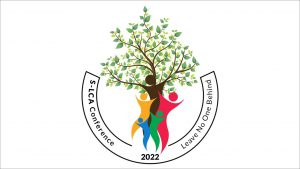
Website: https://slca-conference2022.com
Conftool: https://www.conftool.com/s-lca2022
E-Mail: s-lca-2022@inab.rwth-aachen.de
Bundesanstalt für Wasserbau (BAW)
The Federal Waterways Engineering and Research Institute (BAW) is looking for a Civil Engineer (m/f/d), Building Materials Engineer (m/f/d), Environmental Engineer (m/f/d) or comparable professional profile as Scientific Assistant (m/f/d) for the Department of Civil Engineering, Unit B3, Building Materials, as soon as possible. The tasks include the development of an assessment procedure for sustainability on infrastructure structures of the transport hydraulic engineering, the identification and evaluation of alternative concrete starting materials as well as construction methods and construction methods to improve sustainability and the implementation of approaches with regard to CO2 reduction in new construction and rehabilitation of massive transport hydraulic engineering structures.
The place of employment is Karlsruhe and the position would initially be limited for 3 years (full-time/part-time). The application deadline is February 4, 2022.
For more information, please click here.
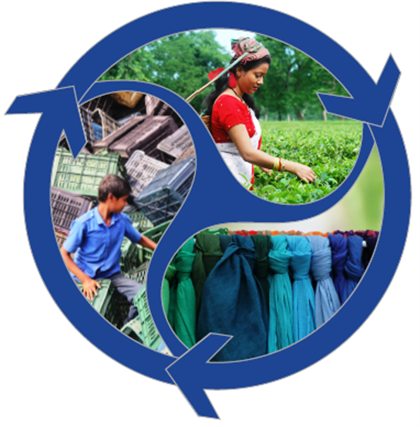
In addition to the Guidelines for Social Life Cycle Assessment (S-LCA) of Products and Organizations published by UNEP Life Cycle Initiative last year, the Methodological Sheets for Subcategories have now been published.
The Methodological Sheets provide an aid to the implementation of an S-LCA. It supplies information on each subcategory of the six stakeholder groups defined in the Guidelines. This includes, among other things, the definition of the subcategories, the policy context, and the connection to the Sustainable Development Goals. In addition, the Methodological Sheets suggest generic as well as specific indicators that can be considered when conducting an S-LCA. The aim is to provide a recipe to achieve more consistency in the application of S-LCA in the future.
The methodology sheets can be found here.
INaB is part of the new Collaborative Research Center (SFB) of the German Research Foundation (DFG) SFB/Transregio 339 “Digital Twin Road – Physical-Informational Mapping of the System ‘Road of the Future'”.
Issues such as durability, efficiency, safety and sustainability represent global challenges in road transport. In order to counteract these and to continue to ensure the mobility of people and goods in the future, scientists from TU Dresden and RWTH Aachen University are developing an intelligent system that virtually maps the road infrastructure and thus enables the analysis and control of efficient and sustainable roads in the future.
Our task as INaB is to set up an iterative Life Cycle Sustainability Assessment (LCSA) within the framework of a Cyper Physical Model. In this way, the influence of processes and materials can be determined at the earliest possible stage and road construction can be made sustainable on a life cycle basis.
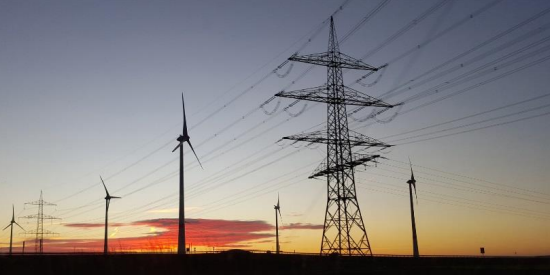
The company enumion is looking for a student assistant to support the team at the location in Cologne. enumion is a management consultancy focusing on energy consulting and sustainability.
The focus of your tasks will be on energy audits and building simulations. Further activities are the preparation of energy data for energy consumption analyses, the work with the software DIN V 18599 and the profitability calculation of energy efficiency measures. In addition, enumion offers active participation in ongoing projects.
The working hours are 8 to 12 hours per week and can be arranged flexibly. Apply here now.
The International Smart Cities School 2021 is now open to all people involved and interested in the debate regarding the contemporary urban question (PhDs or graduate students, freelancers, companies, public employees, etc.).
Registering for the school is free of charge but on a selective basis (max. 30 participants). The participation form is available on the school website.
Participation can also be partial (one or more webinars without co-working laboratory).
The BMW Group offers an internship for students in the area of purchasing and supplier network. As part of the internship, the Sustainability department focuses on providing support in the energy supply chain. Other activities would include CO2 implementation reporting and support in coordinating sustainability goals in the supply chain.
More information on BMW Group Karriere
The recently founded Center for Circular Economy at RWTH Aachen – known as CCE – pools the University’s expertise on circular economy.
For example, it elevates RWTH’s distinctive technical and ecological expertise in recycling and also integrates social affairs, business, science, and digitalization. “In various projects, RWTH has been dealing with the topic of circular economy directly or indirectly for decades. In view of the existing global challenge, it is imperative that we synergistically and systematically apply the expertise from all across the university by uniting it under one roof,” emphasizes RWTH Rector Professor Ulrich Rüdiger.
Right at the beginning, several members of the Center for Circular Economy participated in the event when mayor Sybille Keupen signed the “Circular Cities Declaration”. As sixtieth European city, the city of Aachen is now the second German city that joined the initiative. At the event, the Center members presented their know-how on circularity. Professor Marzia Traverso, e.g., presented challenges of circular economy related to sustainability aspects and how to measure and ensure a sustainable circular economy.
More information on Circular Cities Declaration and Center for Circular Economy.
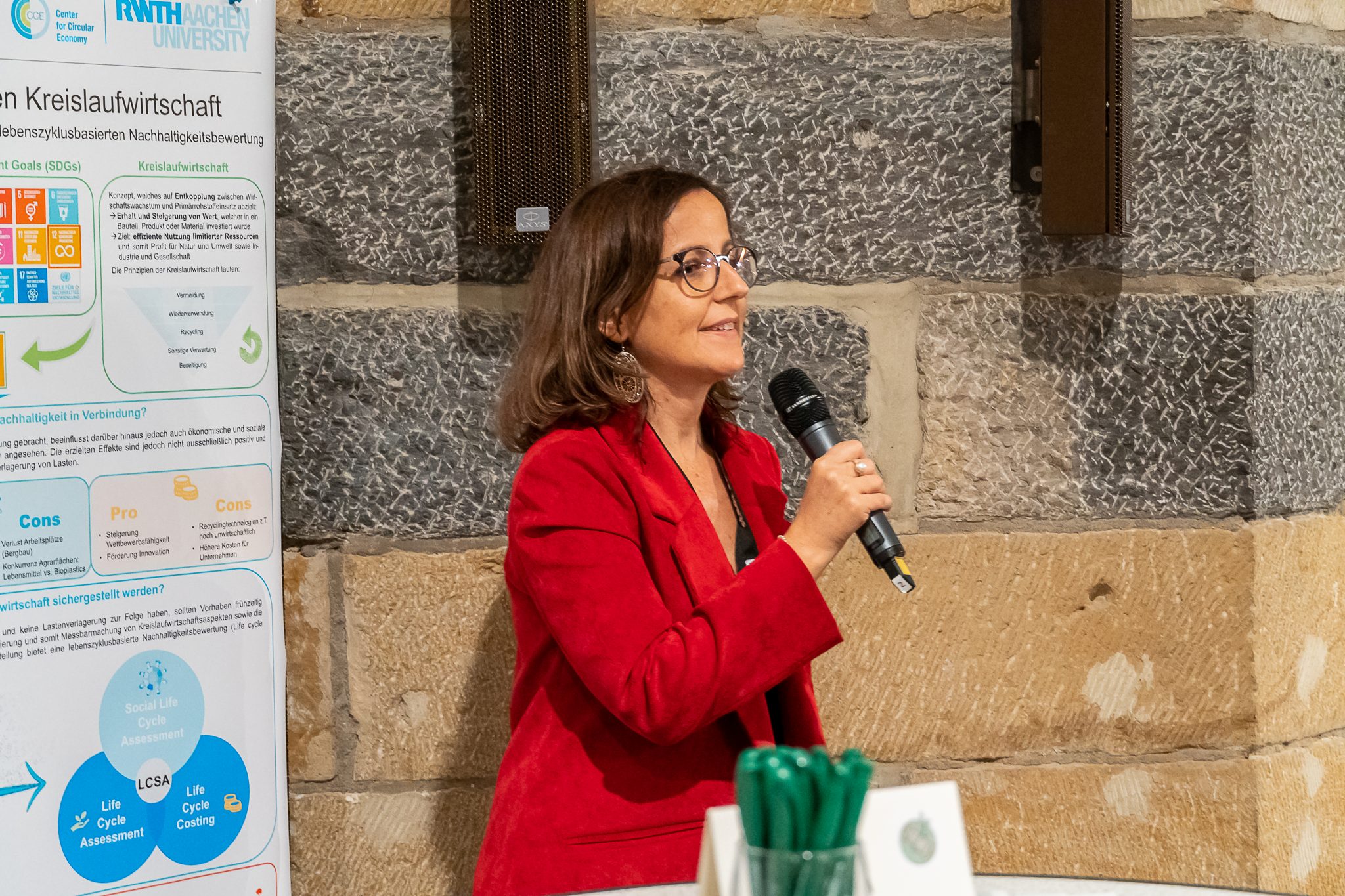
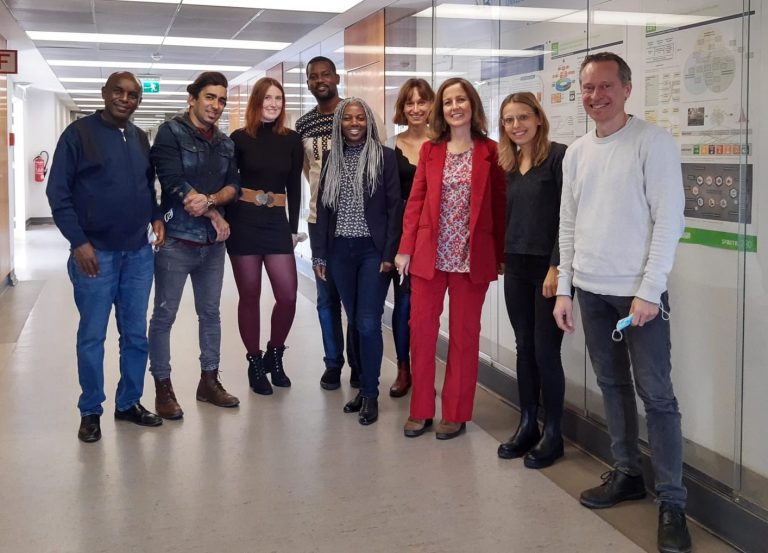
One year after the kick-off of the TeTraPHar Africa project, the Institute for Sustainability in Civil Engineering (INaB) gladly welcomed Francis Mwaijande from Mzumbe University (MU) and Tomson Akankwasa from the Uganda Cleaner Production Centre (UCPC) to Aachen. TeTraPHar Africa is a BMBF funded project submitted and coordinated by INaB on behalf of RWTH University.
The macro-areas of the conference will include:
The call for sessions is now open! The call for abstract will be open soon.

On the 7th of December the SLC Alliance will host a hybrid event entitled “Implementing the New UNEP 2020 S-LCA Guidelines”. This event will take place at the Residence Palace in Brussels and will simultaneously be accessible via an online platform. Registrations are now open until December 1. The programme will start at 13:30 and end at 18:30, with workshops in different languages.


On this year’s Marmomac and Athesis, Elisabetta Palumbo and geologist Piero Primavori talked about sustainability and research for natural stone and stone quarrying. They highlighted the importance of waste being reused to transition towards a sustainable production.
The necessity to strengthen the science-policy interface for sustainable investment has recently been reinforced by IPCC’s AR6 report. Basing policies that serve current and future generations on scientific knowledge is a lesson learned from the the EU Taxonomy process.
In cooperation with Nora Hiller, Ben Allen and the Institute for European Environmental Policy (IEEP), Marzia Traverso gives recommendations for improving the use of science and evidence in decision-making.
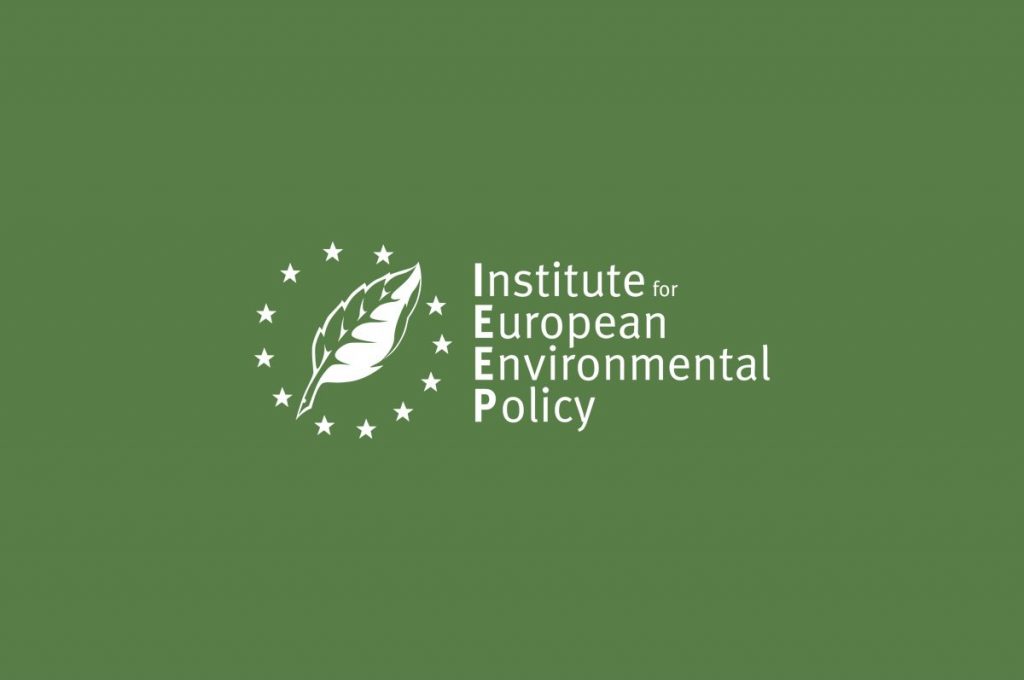

In this online certificate course, you will learn to identify social hotspots in your company and your supply chain. This will enable you to make concrete improvements towards a socially responsible and holistically sustainable company.
Study format: Online Certificate Course
Duration: 2 modules, each half-day except for the first-day
Teaching: Module 1: 15.11.2021 full day, 22-24.11.2021 half days each; Module 2: 17.+18.01. and 20.+21.01.2022 half days each
Credit Points: 2 ECTS (50 hrs. workload)
Course fees: 3.200 € incl. course material & social programme
Qualification: RWTH Executive Certificate
Language: German
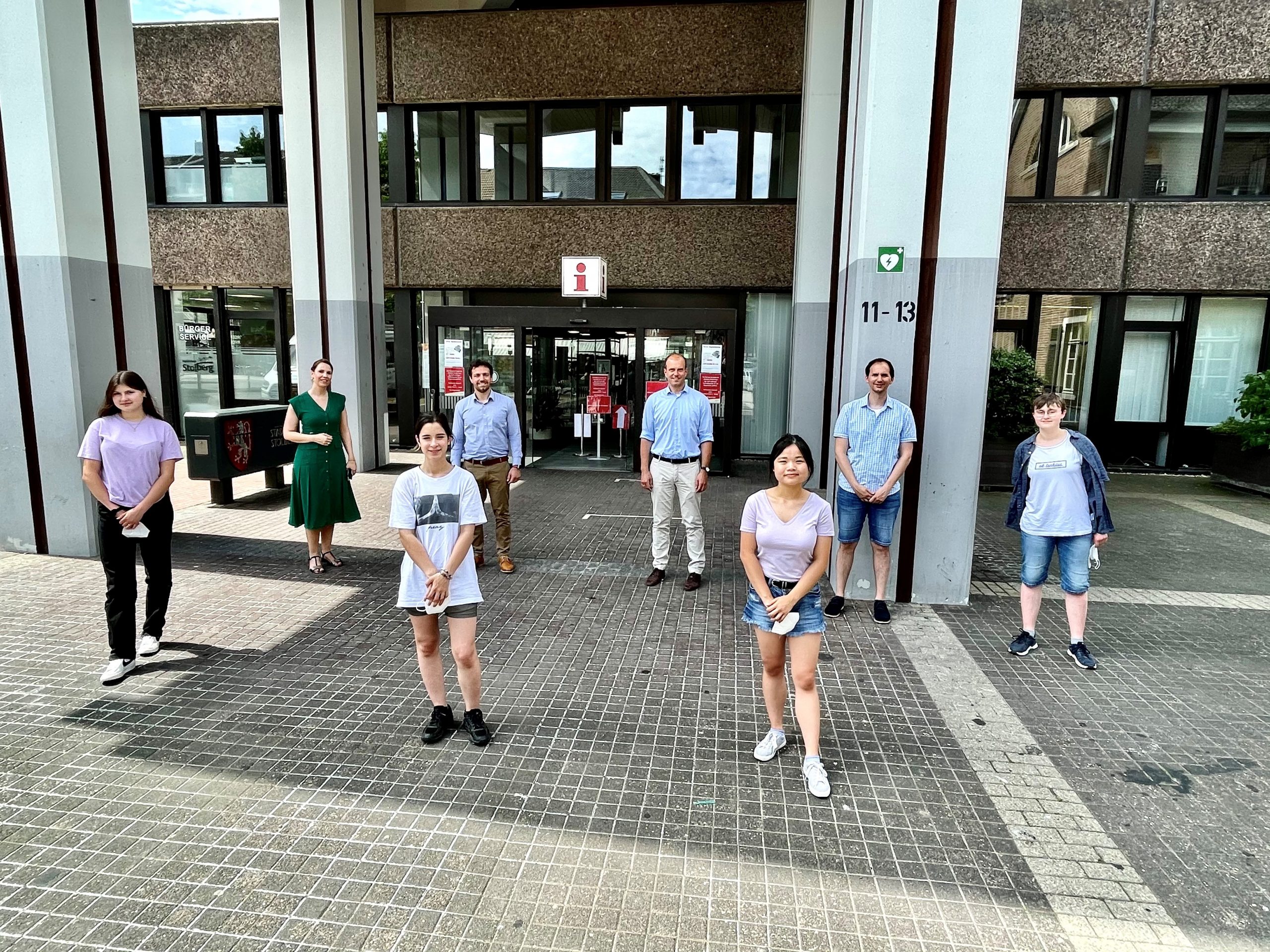
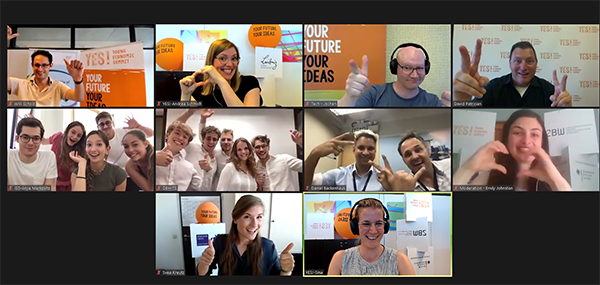
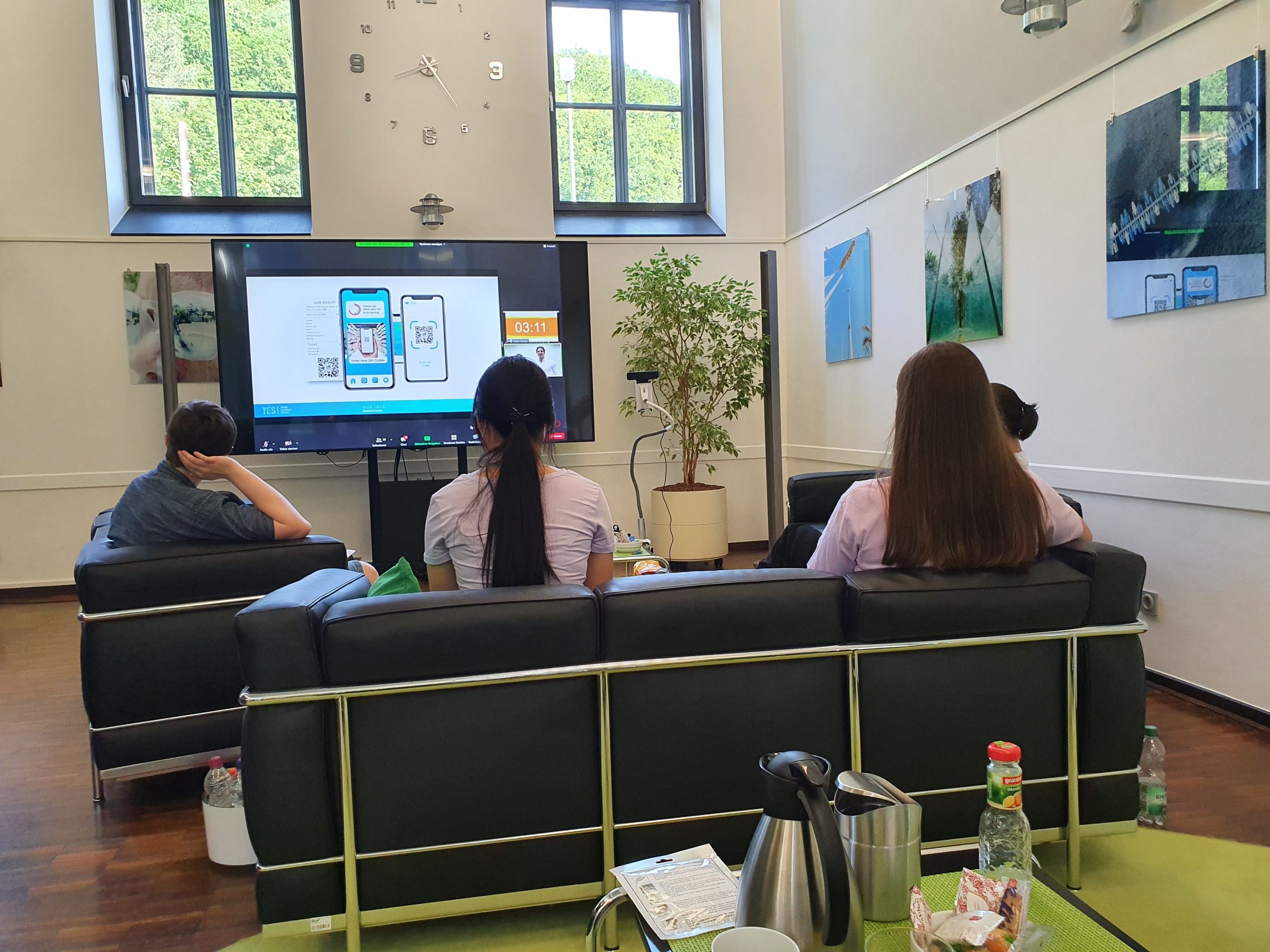
© YES! – Young Economic Summit
YES! is one of the largest school competitions on economic and social challenges in Germany for grades 10-12.
INaB as a partner of YES actively supported the team from Geneva, as well as the team from Stolberg and is very happy about the International School of Geneva’s entry into the finals, which will take place in September (22.-24.09.2021).
The International School of Geneva presented their idea “Green Village”, which included several elements to build a sustainable community housing system. Whereas the Ritzefeld Gymnasium from Stolberg focused on the idea of “A Green Line for a greener future” (a green discovery route through Stolberg), proposing sustainable attractions to improve tourism in cities.
Innovative building envelopes based on a modularly functional textile facade can be used to reduce energy consumption and generate electricity; in addition, the facade filters nitrogen oxides from the air.
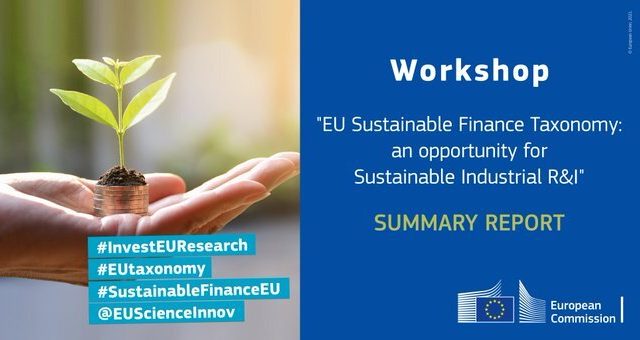
DG Research & Innovation published the summary policy report from the workshop “EU Sustainable Finance Taxonomy: an opportunity for sustainable industrial R&I”. This report summarises the main session discussions and input gathered from the participants in the Q&A sessions.
The main objective of the workshop was to identify key aspects on how to place sustainable finance and the EU taxonomy in the context of industrial R&I and the activities of the European Partnerships, and to help advance the R&I agenda of European industries towards the Green Deal’s objectives.
More than 120 participants from both the public and private sector took part in the discussions with the speakers and gave their views and perspectives in three moderated panel sessions that outlined the way forward. Report
The call for abstracts of the Life Cycle Management Conference 2021 is now open https://www.lcm2021.org/call-for-abstracts.
We invite you to submit a paper for the Social Life Cycle Assessment session and Life Cycle Sustainability Assessment in Construction and Renovation Buildings.
Please submit your Abstract by April 12th, 2021.
Save the date for the project presentation and discussion about the first results of the LIFE MAGIS Project. The partners of LIFE MAGIS will discuss the role of environmental quality and communication in the development strategies of the sectors involved.
The new project brochure for LIFE MAGIS is now available! Go check it out!
Meet Marzia Traverso and Ben Allen, rapporteurs of the Technical Working Group.
Together with Nathan Fabian, they explain their work around #EUtaxonomy and how experts and stakeholders can contribute.
We are delighted to announce the successful launch of the Guidelines for Social Life Cycle Assessment of Products and Organizations 2020.
The event, hosted entirely online, gathered 177 participants from Asia, Africa, Europe, North America and South America. Participants were from various sectors, including Agriculture, Metal Production, Construction, Education, Food, Health services, Public Service, Transport, Research and Development, Environment, Circular Economy, NGOs, Logistics, Energy, Chemical Industry, and Biotechnology.
Watch the full event online
Few words on the Guidelines for S-LCA of Products and Organizations
Since its first edition in 2009, the practice of social life cycle assessment (S-LCA) has evolved from a small circle of academic practitioners to one that now includes stakeholders from industry, policymakers, and business. This means having updated information and guidelines that do not need a prior understanding of lifecycle approaches. It also means ensuring that the right tools are in the hands of those who can inform the decision-making processes. These updated Guidelines fulfills both these objectives.
Because different S-LCA methods have diverging purposes and applications, these 2020 Guidelines do not dictate one path but rather explain the strengths and challenges of different approaches to solve multiple questions. Each section defines the main steps, provides examples and directs the user to additional resources and references.
These new Guidelines are a helpful reference regardless if you are new to S-LCA methods or an expert.
On 28 November the Commission Decision establishing the EU Ecolabel criteria for printed paper, stationery paper, and paper carrier bag products was made public by the EU Commission. This comes after a more than 2 years revision process which saw the revision and merging of existing EU Ecolabel criteria for Printed paper and as well as that for Converted paper products.
INaB was selected by JRC Seville to provide technical support for the revision process. INaB carried out Life Cycle Assessments of converted paper products, market and technical analysis and Stakeholder consultation.
What is EU-Ecolabel?
The EU Ecolabel is a voluntary, multiple criteria-based Scheme to promote the best environmental performing products in the market. The EU Flower is awarded to products that comply with lifecycle-based preset criteria related to sustainable production. The main idea for the review of the Ecolabel Criteria on Converted paper products was to incorporate industry developments over the years following the 2013 version.
What are the benefits?
EU-Ecolabel contributes to improving the image of the company, to resource and monetary savings, to the growth of the company and job creation. It also certifies that the product/services are among the most environmentally friendly in its class and increases the visibility of the product on the market.
More information on the following link:
What is the worst case scenario for Climate Change? Could humanity go extinct or our civilization collapse? Luke Kemp, a Research Associate at the Center for the Study of Existential Risk (Cambridge University) has thought a lot about this. Luke will talk about what we have learned so far, and what is still unknown in the field of extreme climate change. Subsequently, we will have time to answer your questions and to dig deeper in a Q&A.
What? Talk and Q&A with Luke Kemp about Catastrophic Climate Change
When? Tuesday – 8th of December, 18:30 Berlin Time
Where? https://rwth.zoom.us/j/92125702924?pwd=a3Y0UGhyR0VuQ0RlWWt1Skx4cGp3UT09
Feel free to share the Facebook event with people that might be interested: https://fb.me/e/3r2kc3YKr
The event will be part of a university course on effective altruism which is open to everyone who is interested. Learn more: www.ea-aachen.org/uni-course
We have developed a questionnaire on the topic of life cycle assessment. How it is used in practice today and how it can be further applied. We would be very pleased if you could take 8-10 minutes of your time for the questionnaire. You are also welcome to share the link with your network.
You can access the survey via the following link: https://www.umfrageonline.com/s/b6677c5
Your participation is anonymous and your data will be treated confidentially and exclusively in connection with this study. The survey will be available until 20.12.2020.
Thank you very much for your support!
The Forum for Sustainability through Life Cycle Innovation (FSLCI) organized its second conference on Life Cycle Innovation in virtual form from August 26-28 2020. The conference report gives an overview of the LCIC 2020 and some of its highlights.
Included is a workshop on page 13 with the title:
Workshop 9: A new methodology being no more contemporary? How to interpret and weight the outcomes of LCSA!
The workshop organized by Jana Gerta Backes addressed the current state-of-the-art of LCSA (Life Cycle Sustainability Assessment), its use and interpretation and the challenges the methodology faces. Report
In response to a call for applications on 18 June 2020, the Commission selected 50 members and 10 special observers on the basis of their environmental, sustainable finance or social/human rights expertise.
The European Commission recently published the list of members of the Platform. Wherein Prof.-Ing. Marzia Traverso was selected for the platform on sustainable finance. Congratulations!
The platform will advise the Commission on the development of technical screening criteria for the EU taxonomy, and policy development, amongst other things, as required by the Taxonomy Regulation.
At the end of August the 2nd Life Cycle Innovation Conference (LCIC 2020) was successfully organized. The good news is that even if you missed the conference, you can now get access to all keynotes, panels and pre-recorded presentations! In order to make this amazing content available for a large audience, you can get access to it from 20€.
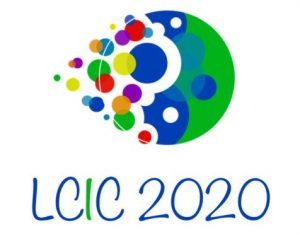
The conference, which took place virtually as a response to the global pandemic, was attended by a diverse crowd of more than 120 change-makers, innovators, entrepreneurs, researchers, practitioners and decision-makers with a passion for sustainability.
The conference combines a variety of different formats to create a unique space to engage also in a virtual setting. The conference focussed on sustainable innovation, circular economy and climate change. More Information
Key Dates:
29.09.2020: Resources and sustainability
– with a key note speech from Prof. Traverso –
06.10.2020: Open space, landscape and agriculture
13.10.2020: Buildings, neighborhoods and energy
20.10.2020: Mobility and Infrastructure
27.10.2020: Society and urbanity
In addition to key notes and practical reports on the challenges of structural change, a poster session is an integral part of every themed day. Every session will be followed by a plenary discussion.
The free registration and further information can be found on our website at www.rwth-aachen.de/ipe.

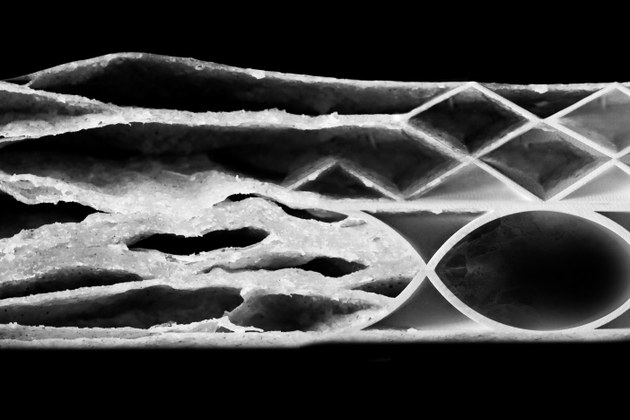
Professor Traverso and the team of the Institute for Sustainability in Civil Engineering are pleased to announce that the Collaborative Research Centre Transregio 280 has been approved by the DFG as part of the research association of the RWTH Aachen and TU Dresden. An interdisciplinary research team – inspired by mathematics, botany and art – is using carbon concrete to develop new concepts for resource-saving and material-minimised construction.
The adaptive manufacturing method in the production process and the continuous evaluation of sustainability over the entire life cycle promise to point the way forward in the development of strategies for constructions made of carbon concrete.
The approval of the DFG heralds the start of the first four years of the Collaborative Research Centre, which will run for a total of 12 years with a Budget of 29 Million €.
Key Dates:
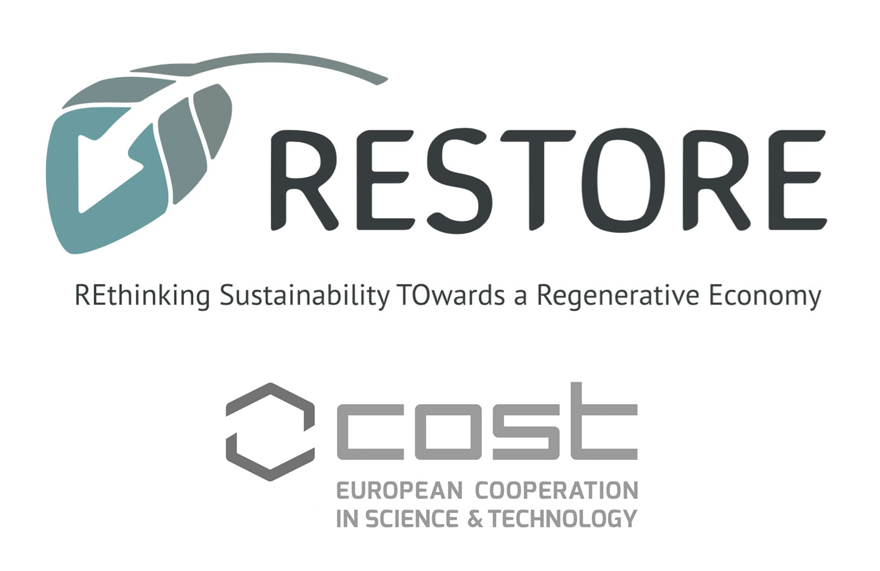
10th August 2020 – Applications submission Deadline
20th August 2020 – Confirmation to the selected Trainees
07th September 2020 – Deadline for e-Cost registration and confirmation
09th September 2020 – Communication of Teams/Distribution of preparatory material
21st-25th September 2020 – From Monday 9.00 to Friday 16.00
Are you interested in such an experience?
Spread the word and / or apply now! Here is the link: https://lnkd.in/e8ZxE93

On behalf of BMW, the Institute for Sustainability in Civil Engineering has conducted a life cycle assessment for the plug-in-hybrid car X3 xDrive30e. More
To help support decision making on mitigating actions in the transport sector it is paramount to develop a better understanding of the environmental impacts of road vehicles over their entire lifecycle. The following Report focuses on LCA studies for vehicles.
New Report: Determining the environmental impacts of conventional and alternatively fuelled vehicles through LCA
This report summarises a range of vehicle life-cycle assessment (LCA) studies available in the public domain, which were found to be of varying focus, data quality, detail and coverage. It develops a policymaker-oriented LCA methodology for light- and heavy-duty vehicles covering a selection of major powertrain types and fuel chains for the 2020 to 2050 timeframe. Report
Professor Traverso was elected Equal Opportunities Representative of the Faculty of Civil Engineering at RWTH Aachen University. Starting in July 2020, Professor Traverso will be officially committed to the equality of all genders for the next two years with all her expertise and experience. Congratulations!
The summer school will be organized under the theme “Bio-economy and the food life cycle – A life cycle management toolbox for sustainable regional food and biomass” from 21 September to 8 October 2020. Due to the global Covid-19 pandemic, LCSS 2020 will take place this year as a virtual summer school! More

 Among the most commonly used types of beverage bottles are bottles made from plastics for single use. The environmental impact of single-use plastic bottles has been widely discussed in society. To mitigate the environmental problems of single-use plastic bottles, there is a need to consider alternative solutions. This report summarises current knowledge about the environmental performance of single-use plastic bottles and their alternatives, and analysis how this knowledge can be used to guide policy makers and other actors.
Among the most commonly used types of beverage bottles are bottles made from plastics for single use. The environmental impact of single-use plastic bottles has been widely discussed in society. To mitigate the environmental problems of single-use plastic bottles, there is a need to consider alternative solutions. This report summarises current knowledge about the environmental performance of single-use plastic bottles and their alternatives, and analysis how this knowledge can be used to guide policy makers and other actors.
Calculate the social, environmental and health impact of your business working from home.
Used in e-mobility and electronics, batteries are essential to achieve the EU objective of decarbonisation of the economy and other challenges related to sustainable development. Several policy initiatives have been issued and others are under discussion to promote sustainable and competitive production of batteries in the EU. Recently, various stakeholders highlighted social risks related to supply chains of batteries and in particular in regard to the provision of raw materials.
The aim of this survey is the weighting of different indicators for the assessment of mobility services. These indicators assess, for example, noise pollution, space occupancy or impacts on health and safety.
The results of this survey help to prioritize these various aspects. To do so, the indicators are compared pairwise. Taking part in the survey takes about 10 minutes. We would highly appreciate if you could take the time to complete the survey: https://www.umfrageonline.com/s/indicator_weighting_a
If you have any questions feel free to contact:
Katharina Gompf
Mail: Katharina.Gompf@bmw.de
First standardized guidelines to measure plastic pollution across corporate value chains published by the Plastic Leak Project
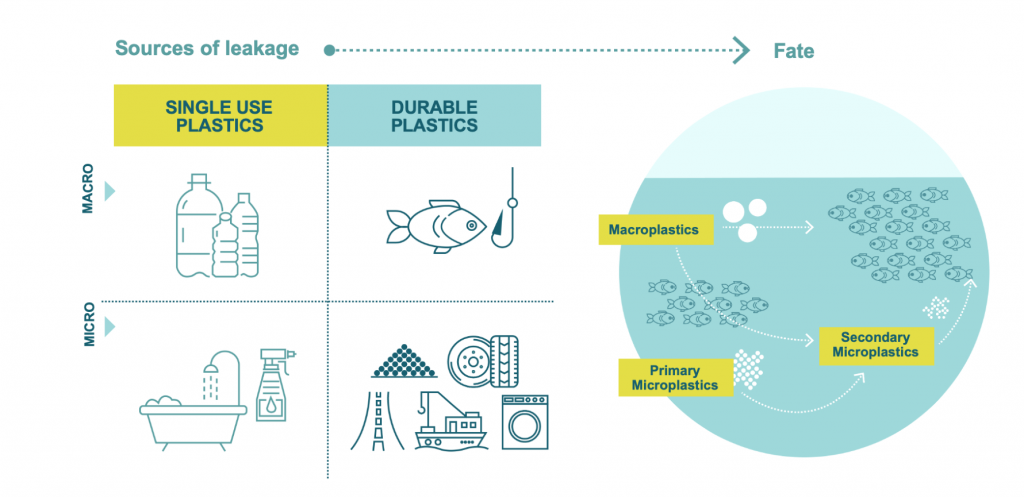
The INaB is part of the Aachen2050 movement. We need a large, shared and sustainable picture of the future. Aachen2050 is currently building a regionally oriented platform that brings together and coordinates acting and interested supporters and wantes to develop the urban region into a common future.
Do you want to know more?: https://www.buergerstiftung-aachen.de/projekte/interne-projekte/aachen-2050.html
Become a fan!: https://aachener-bank.viele-schaffen-mehr.de/aachen2050
The aim of the association is to concentrate the skills of the engineers on the reconciliation of nature and people and to give the engineers and other contributing faculties precisely this philosophy as the basis of all their “doing and acting”.
If you would like to know how to support this association please visit the following website: https://humanotop.earth/
INaB is part of The Steering Commitee in the project on ‘Revision of the Guidelines for Social Life Cycle Assessment’
The 3rd Draft of the revised Version of the guidelines for S-LCA of Products is just posted online.
The aim of the project group is to launch the Social LCA Guidelines as UNEP publication in June in conjunction with the Social LCA conference in Gothenburg (June 17 2020).
If you would like to know more about this project visit please the two following websites:
https://www.lifecycleinitiative.org/updating-the-social-lca-guidelines/
NEWS: FOR MORE REPAIRABLE & DURABLE PRODUCTS
EN 45554: A standard that works for the environment – Learn more


Apply now: Life Cycle Summer School 2020

This year’s edition will focus on the theme “Bio-economy and the food chain – A life cycle management toolbox for sustainable regional food and biomass development”. The Summer School will be held in Berlin, Germany, from 9 – 12 October 2020. More
Guest Lecturer at INaB the 9th January 2020
Dr. Henry Abanda from Oxford Brookes University/UK
Titel: BIM for Building Environmental Performance Evaluation
Where: Lecture Hall H08, CARL, Claßenstr. 11, 2. Floor, Room219
When: Donnerstag, 09. Januar 2020 10:30 – 12:00 o’clock
Studyline: “Bewertungsmethoden für nachhaltiges Bauen”
Dr. Henry Abanda PhD, Dipl.-Ing.,PGcert (Distinction), BSc (Hons), CEng, MIET, FHEA
Henry Abanda has a BSc (Hons) and Dipl.-Ing. in Mathematics/Physics and Civil Engineering from the University of Buea and École Nationale Supérieure Polytechnique (ENSP) de Yaoundé. After obtaining his degree in Civil Engineering in 2003, Henry worked as a Project Engineer on projects funded by the governments of Cameroon and Japan. Later, Henry obtained his PhD from the School of the Built Environment at Oxford Brookes University in the UK in 2011, where he is today a Senior Lecturer and Researcher.
His research interest is in the area of emerging digital construction technologies. He has designed, implemented and delivered BIM related courses on the undergraduate and post-graduate programmes in the School of the Built Environment (http://hardhatsatbrookes.blogspot.com/2016/05/msc-building-information-modelling-and.html). Recently, Henry mentored a group of students from the School of the Built Environment at Oxford Brookes for the first ever WorldSkills UK Building Information Management (BIM) – Regional Competition. The competition took place between 17- 19 June 2019 at the Autodesk University Conference where the team from Oxford Brookes competed with students from South Bank and Middlesex universities. Out of the first 3 students selected to represent the region, the first two were Henry’s mentees. (https://hardhatsatbrookes.blogspot.com/2019/07/autodesk-university-conference-june-2019.html).
He is currently supervising 4 PhD students working on construction project management, facilities management, BIM, Big Data and the Semantic Web. Prior to this, he had co-supervised 2 PhD students to completion. He is an external examiner in many European Universities. He recently examined a PhD candidate in the Maersk Mc-Kinney Møller Institute-The University of Southern Denmark. Henry has delivered BIM lectures at the Universidad de Lleida-Spain, Ecole Nationale d’Ingénieurs de Tarbes-Institut National Polytechnique de Toulouse-France, UN-Habitat III conference in Quito, Ecuador, School of Planning and Architecture-New Delhi-India-a top tier institution of learning in India, Architectural Association of Kenya (AAK), Ecole Nationale Supérieure Polytechnique de Yaoundé and Ecole Nationale Supérieure des Travaux Publics- Yaoundé, Cameroun. Henry was the lead facilitator in training 180 UK-based construction professionals through hands-on workshops on the use of BIM for construction project management and quantity surveying as part of the European Regional Development Fund Programme FutureFit Build Assets funded project.
Visit of the Green Talents to RWTH Aachen on the 16th of September 2019
With the participation of the Institute for Sustainability in Civil Engineering (INaB), the Chair of Sustainable Raw Material Extraction and the Institute of Raw Materials Engineering (MRE) as well as the International Office / Welcome Center, the award-winning students will be given an insight into the RWTH Aachen University. For the past ten years, the Federal Ministry of Education and Research (BMBF) has been honoring outstanding junior scientists from all around the world in the field of sustainability research through the international Green Talents competition. So far, “232 green talents” from 65 countries have been announced. This year’s motto is “Smart Green Planet – Solutions for a Sustainable Future”, which focuses on the benefits of new digital technologies for achieving the 2030 Agenda.


The International Social LCA Forum 2019
The International Social Life Cycle Assessment (S-LCA) Forum is an international event arranged by the Department of Economic Studies of the University “G. d’Annunzio” of Pescara-Chieti, in collaboration with Ecoinnovazione, the Social LCA Alliance, Region Abruzzo and in cooperation with UN Environment.
The event is taking place in Pescara on the 5th & 6th of December.
The registration for the International Social LCA Forum 2019 is now open!
Important deadlines:
15 October 2019 – Deadline for abstracts submission
5 November 2019 – Abstract acceptation notification
For more information visit: slcaforum.unich.it
Students of the Osaka University visit the INaB
On their EU Tour 2019, a group of students and professors from the Osaka University visited the INaB. We presented the INaB and layed a foundation for future exchange. Thank you for the nice day!
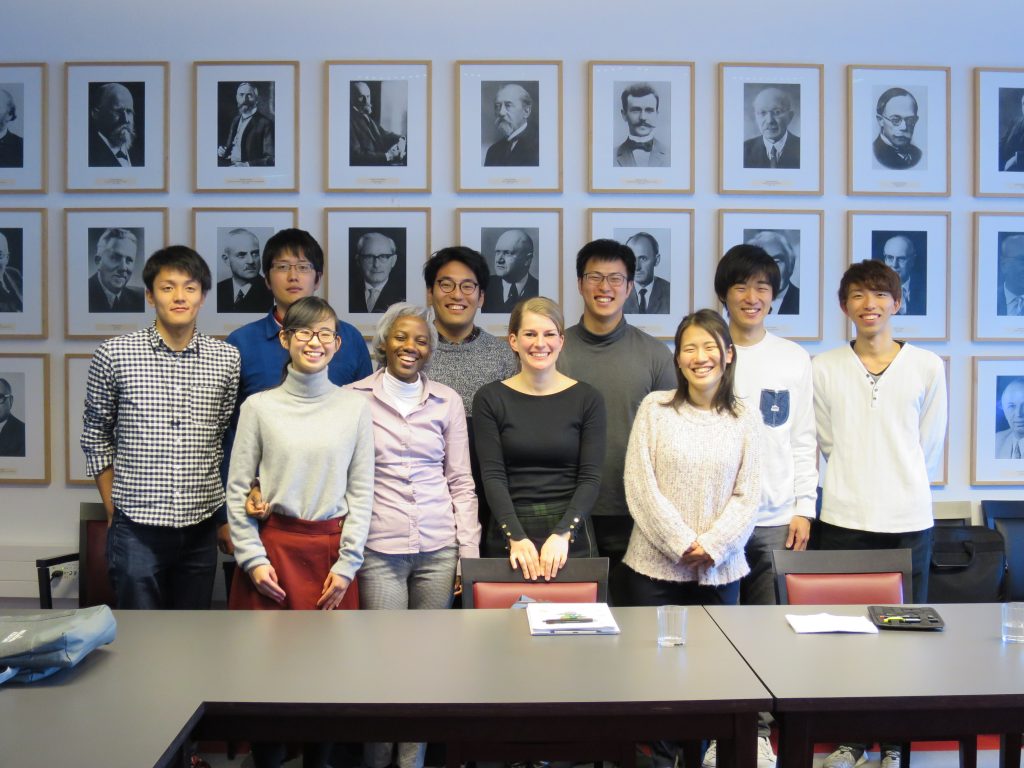
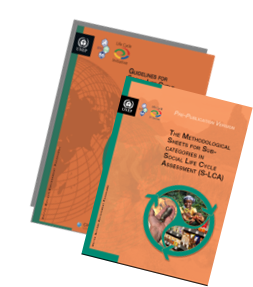
Second Workshop on the Revision of the NEW Guidelines for S-LCA
The second workshop on the revision of the NEW Guidelines for S-LCA has recently been announced. It will take place on April 24th to 26th in Paris, France.
We are happy to welcome more participants.
Find more information here: https://www.lifecycleinitiative.org/
Deadline extension for Special Issue on Social Life Cycle Assessment
The deadline for submitting papers in the Special Issue Social Life Cycle Assessment—The Implementation in Different Sectors has been extended until March 31, 2019.

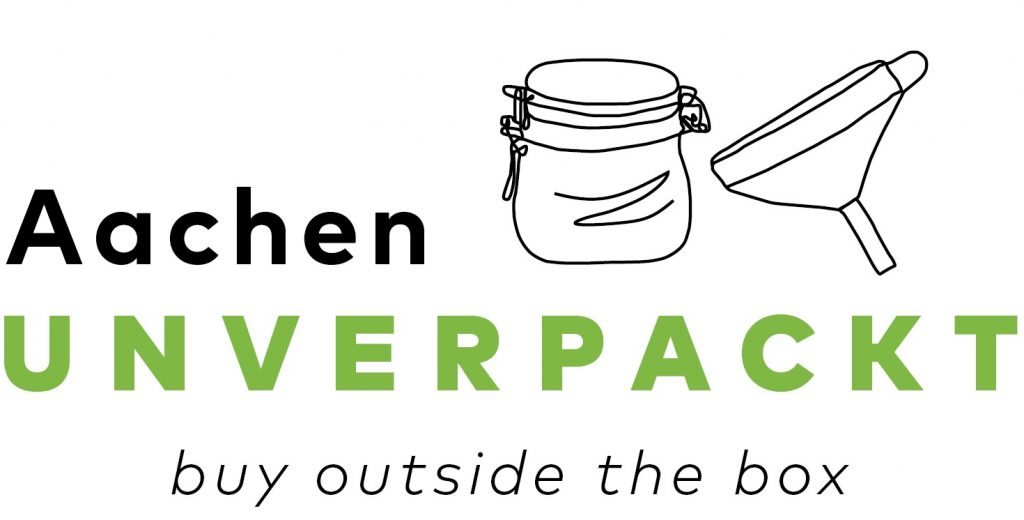
Prof. Marzia Traverso is patron of “Aachen Unverpackt”
The initiative “Aachen Unverpackt” was founded in the summer of 2018 and is still growing. To support the initiative, Professor Marzia Traverso was asked to be their patron. This is a great chance for “Aachen Unverpackt” and the INaB to show how a more sustainable life can be practiced. Some more tipps for a Zero Waste and responsable lifestyle are in our blog chapter “Your Sustainability“.

Special Issue on Life Cycle Sustainability Analysis of Resource Recovey from Waste Management Systems in a Circular Economy Perspective
Theo Online-Journal Resources will publish a Special Issue on Life Cycle Sustainability Analysis of Resource Recovery from Waste Management Systems in a Circular Economy Perspective.
Deadline for countributions is April 30, 2019.
Revision of the Guidelines of Social Life Cycle Assessment under the umbrella of the Life Cycle Initiative
Big steps have been made during the first Workshop on the revision of the Guidelines of Social Life Cycle Assessment for Products in Pescara, Italy. The next workshop is planed for April 2019.
More informationen under: https://www.social-lca.org/news/


Special Issue on Social Life Cycle Assessment
The Online-Journal Resources will publish a Special Issue on Social Life Cycle Assessment – The Implementation in Different Sectors.
Deadline for contributions is the January 31, 2019.
Chapter on the handling of Externatlities recently published
Marzia Traverso and colleagues recently published a book chapter discussing externalities in the context of social life cycle assessment.
The chapter is downloadable open access here.
